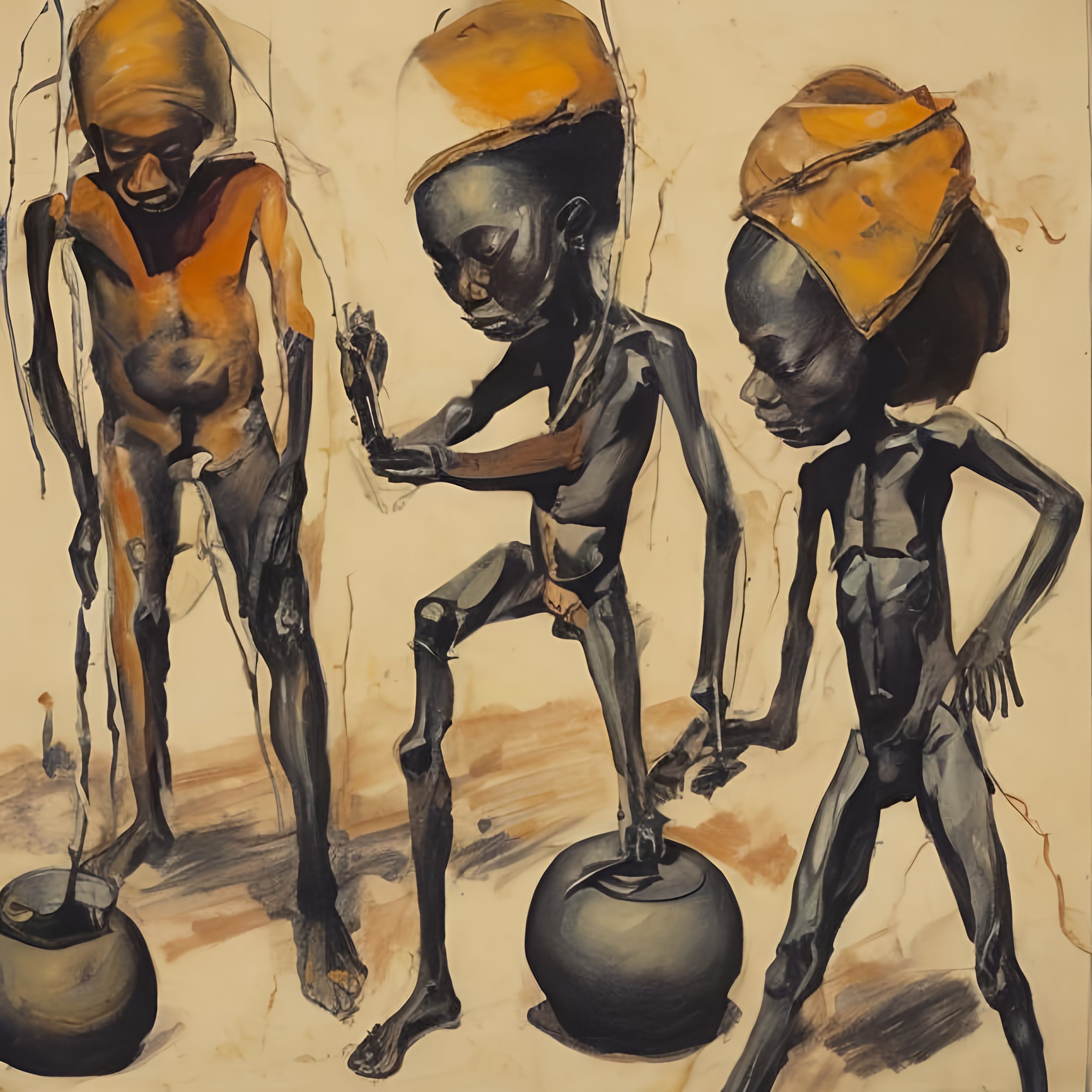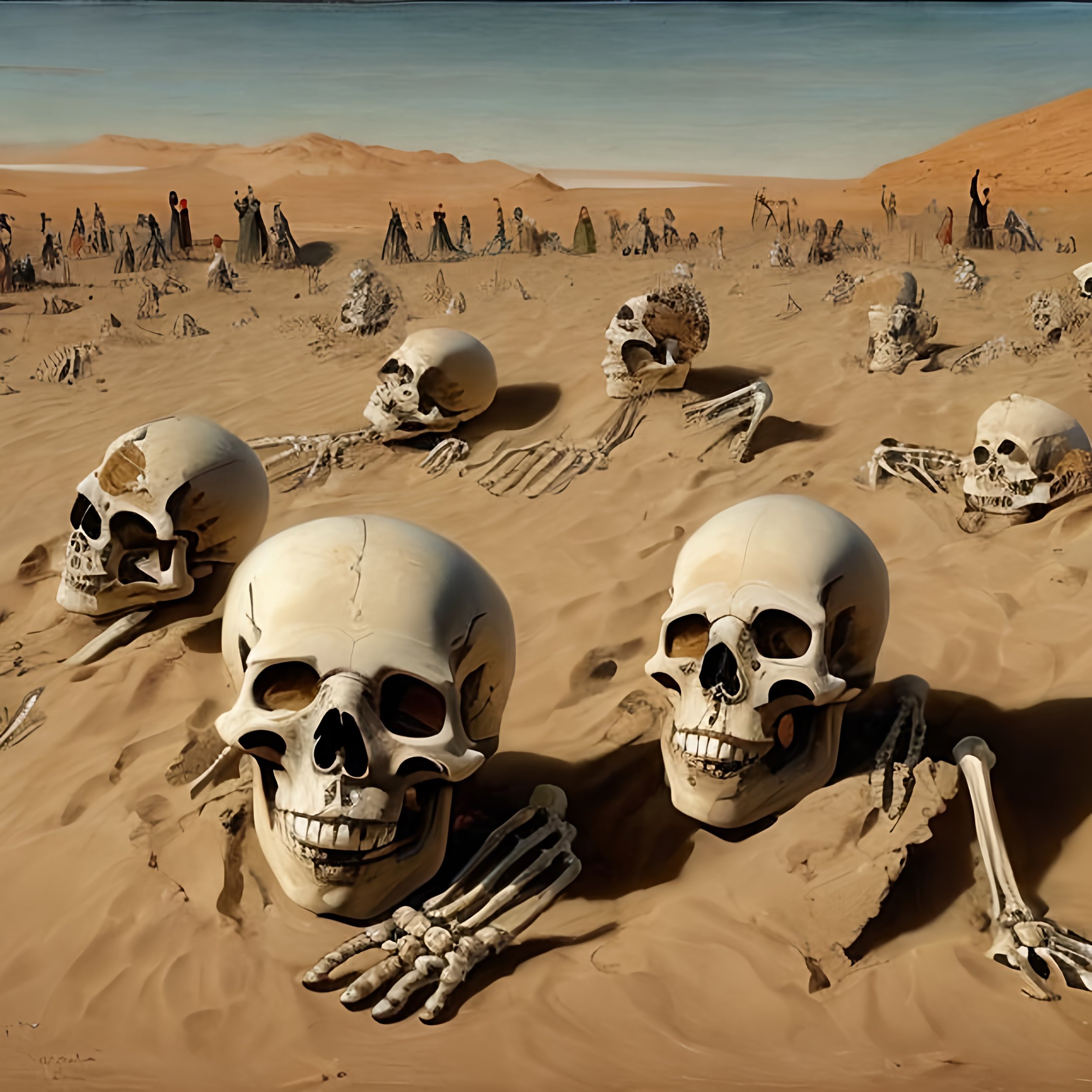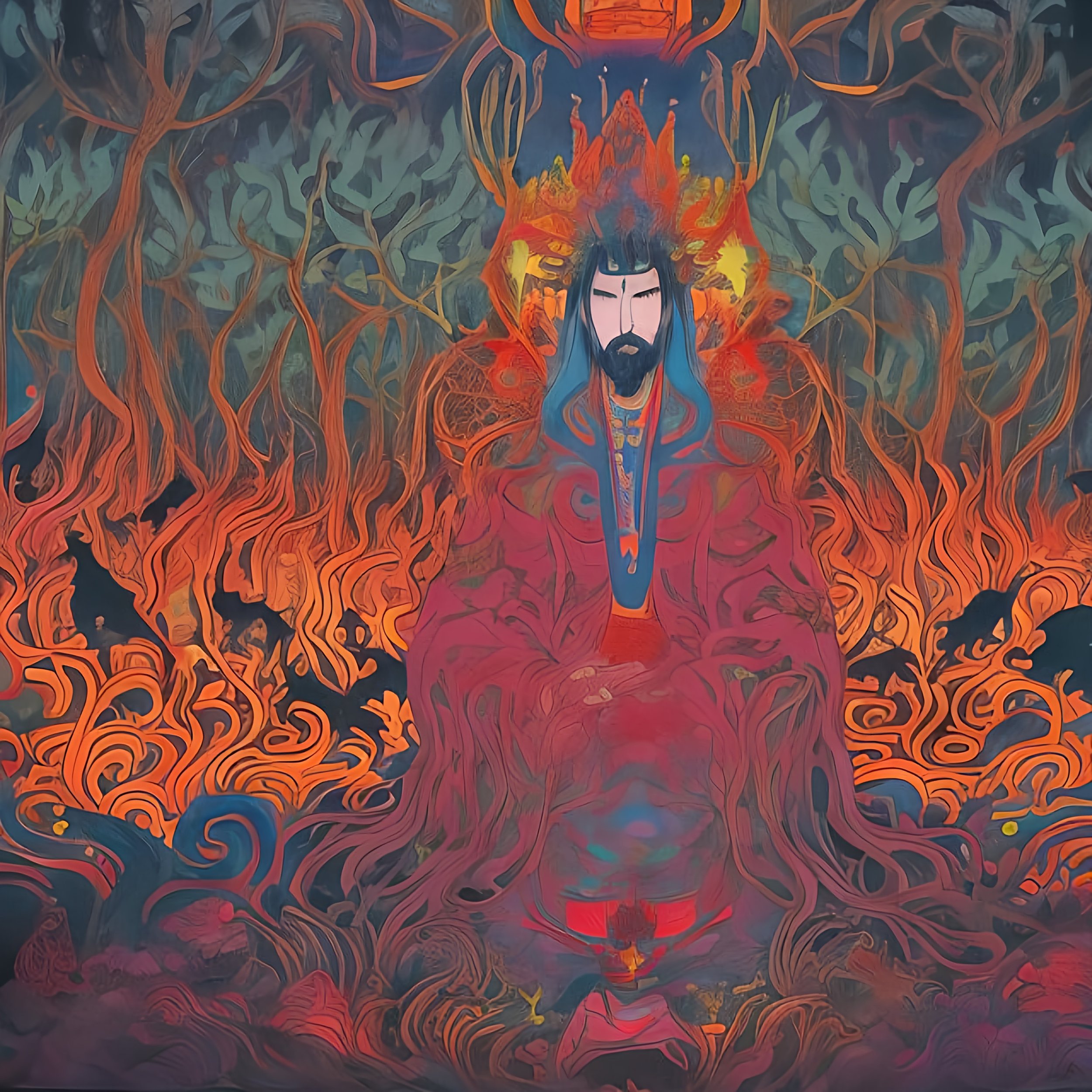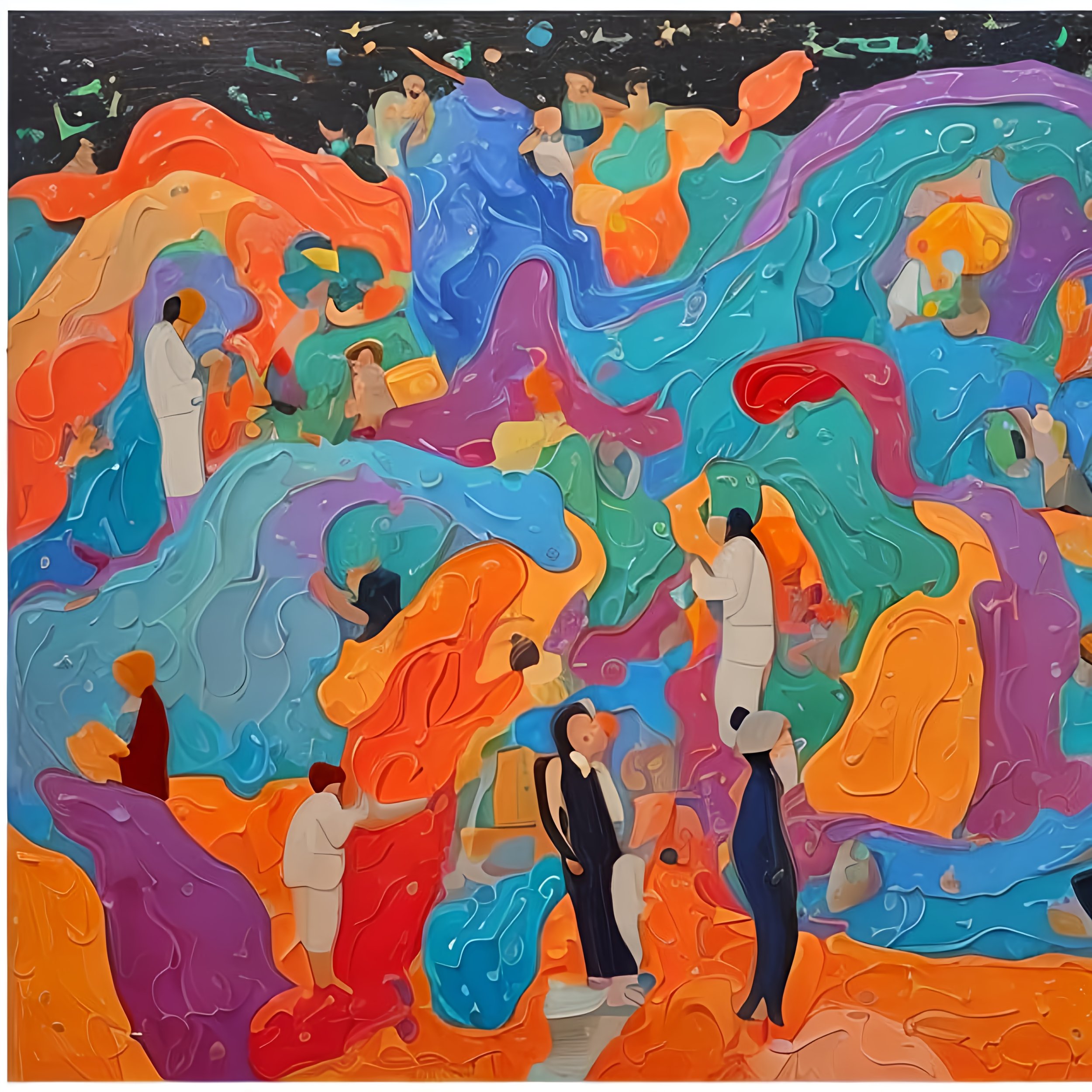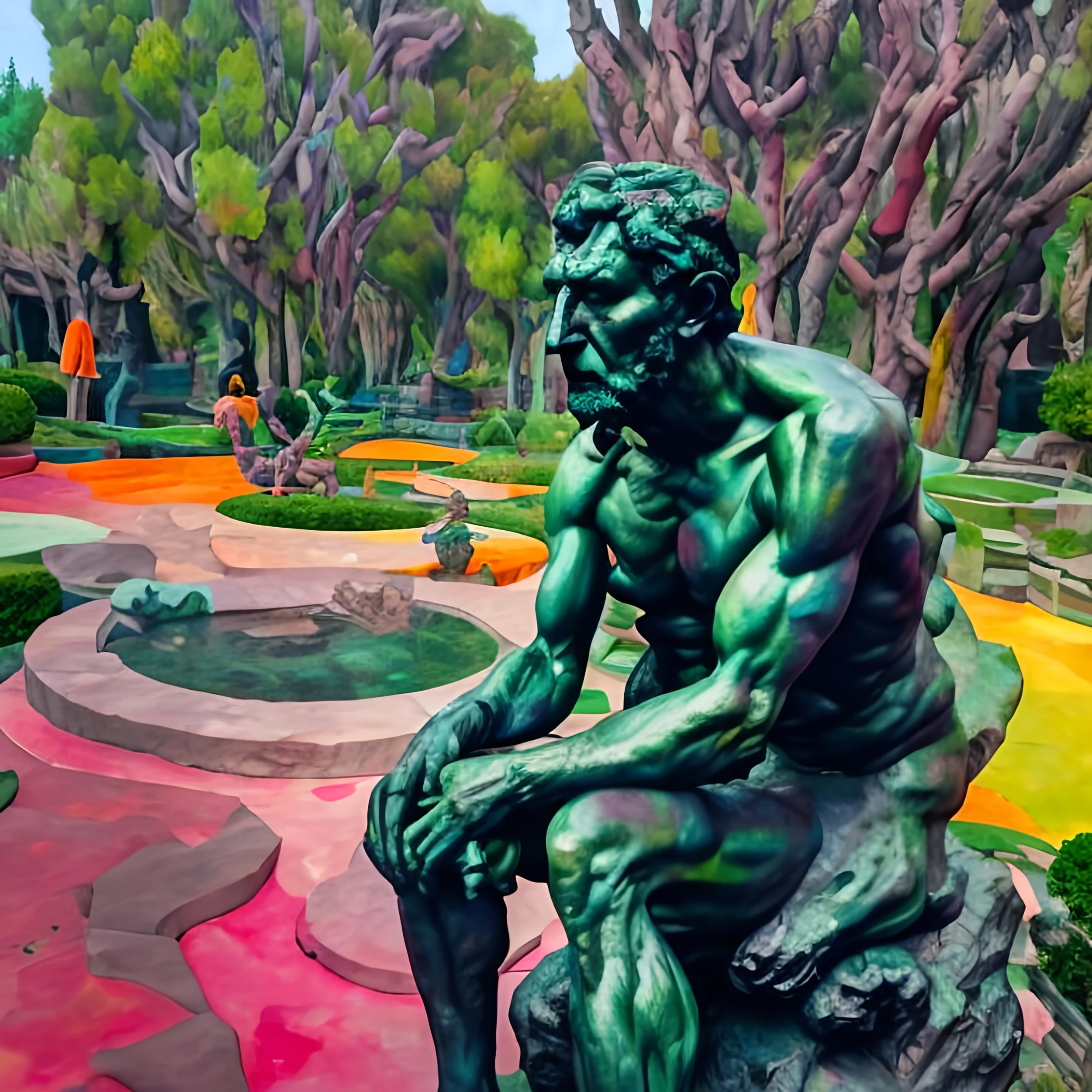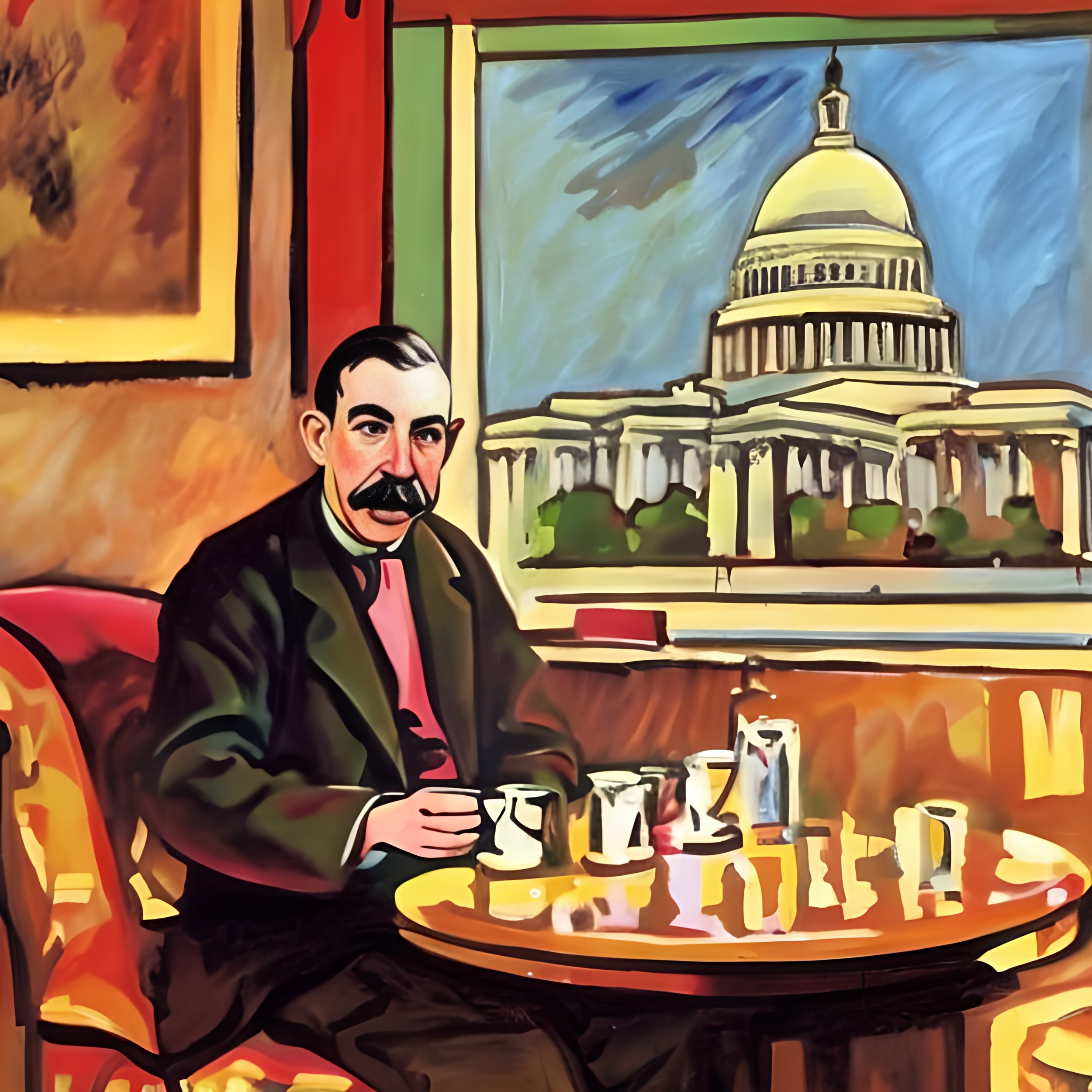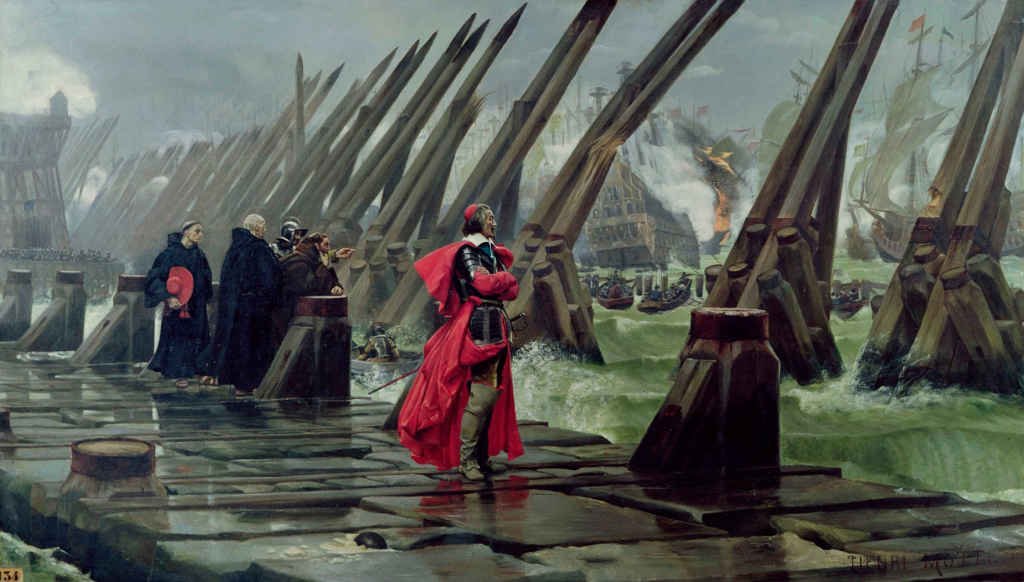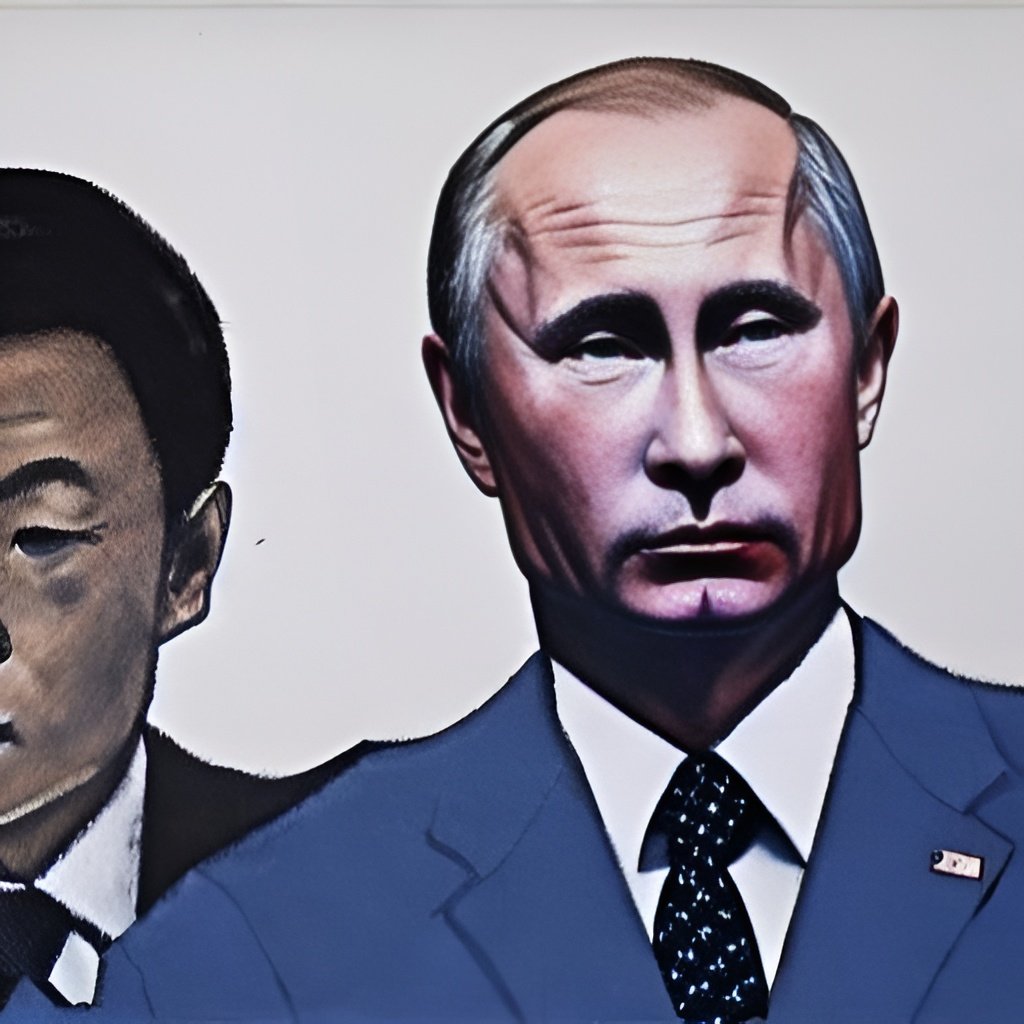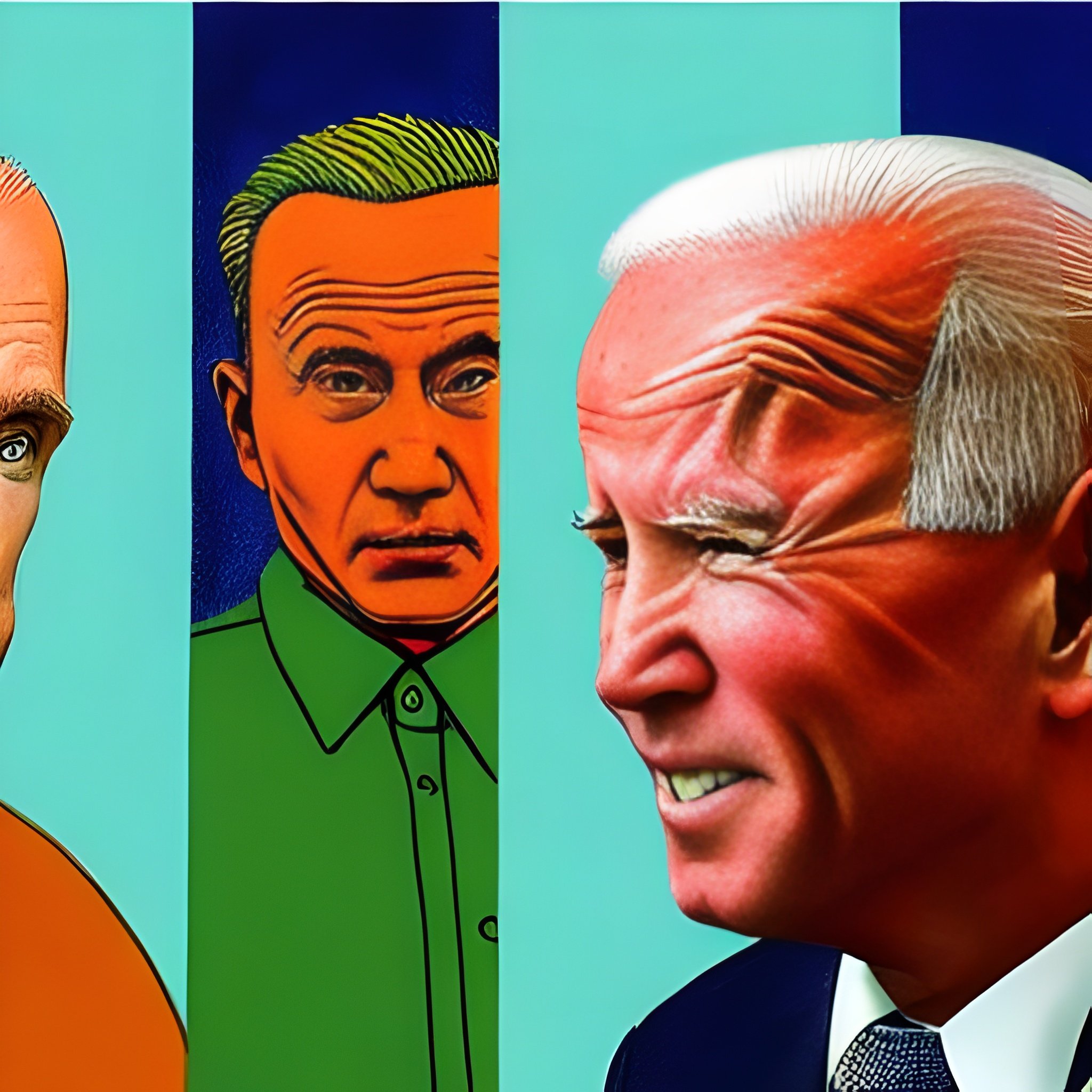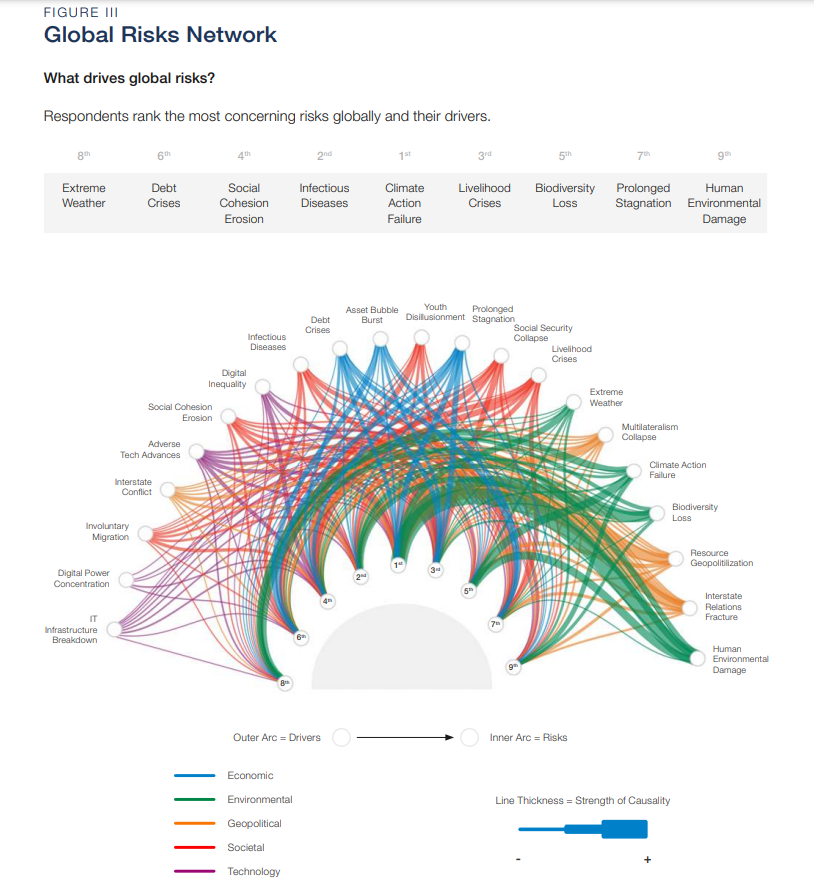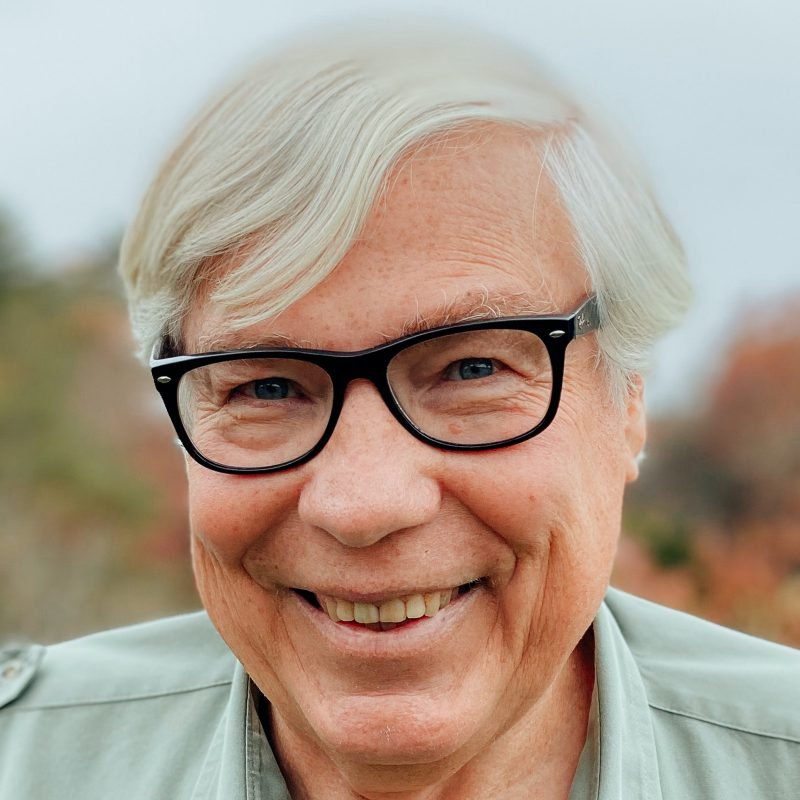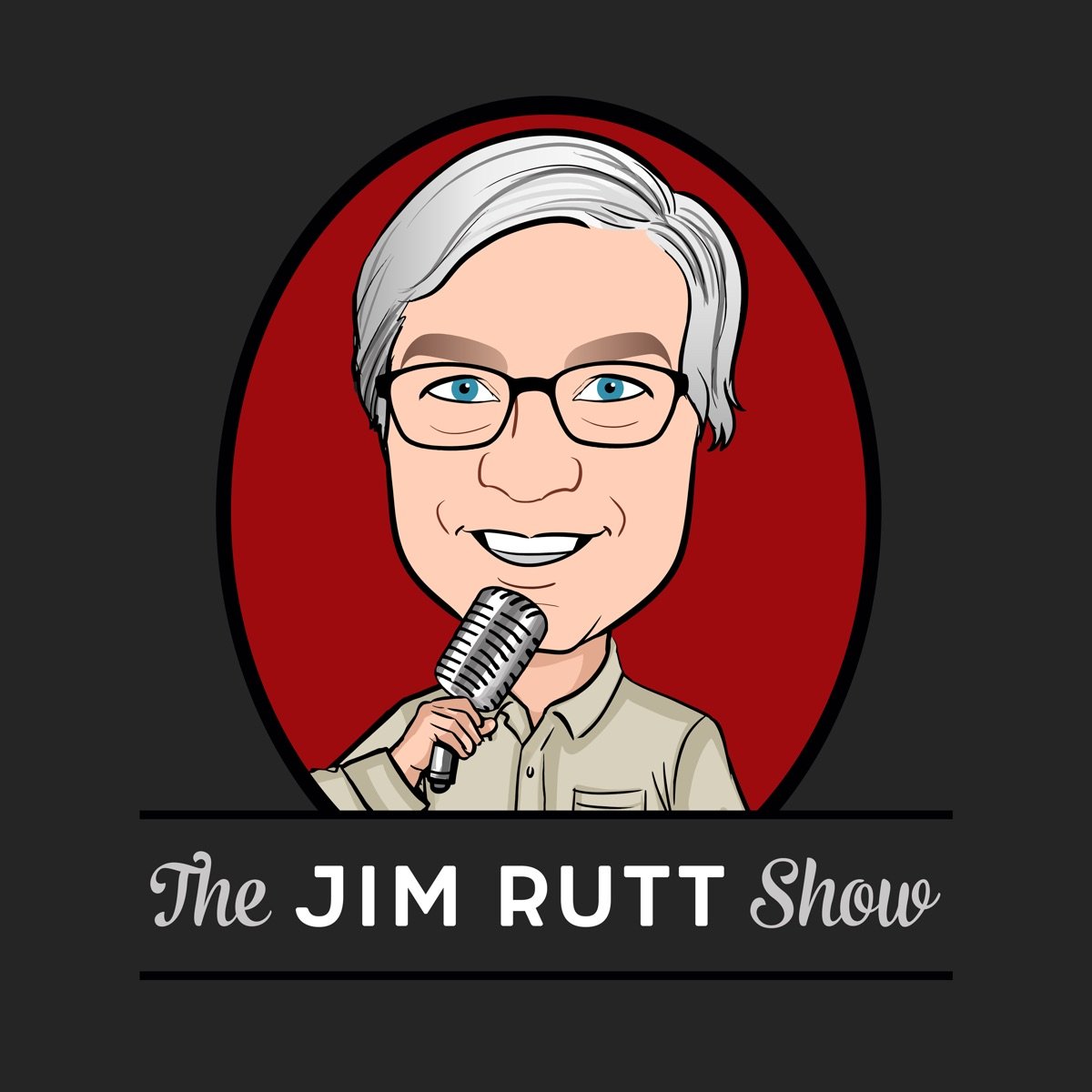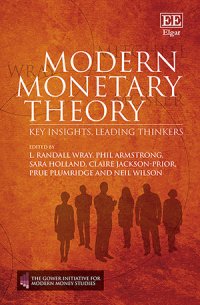
Become Aware Of It, Pay Attention To It. Read About It, Learn About It, Write About It, Talk About It. Teach It.
Reflections upon anything under the sun and beyond. It may not be easy to be a Global Citizen, but it's not hard to engage the Globe.
Ammo Dump Earth
Comments inspired by Patrick Lawrence: Full-Dress Irrationality.
"Biden wastes an additional $105 billion"—but America can't afford school lunches or public education. The Fed can't find the money.
"The Racket" existed way before 'The Vietnam Syndrome'; it is an American affliction rooted in waves of colonial violence motivated by "Great Men of History" and their brilliant philosophies. The Enlightenment could have brought the world into an age of Enlightenment but instead withered into the black death of avarice—an operatic conflagration of The Seven Deadly Sins fueled by percolating ancient carbon-based life forms.
No majority of citizens in the United States can stop Congress and its funders from doing what THEY want. The system's logic has programmed our leaders to continue playing The Great Game as long as possible.
Americans are there to borrow and consume—that's their job.
The Super-Smart guys in the United States are working to accelerate the collapse. Depletion and destruction (creative destruction) is the most lucrative thing they can do. The Great Game is about controlling resources and the wealth those resources generate, from material commodities to the data generated by their debt peons. Their madly defended delusion is that they and theirs will survive the die-off of the plebs and proles due to overshoot in their bunkers, fortresses, or on Mars. They are exceptionally selfish and arrogant. There is no limit to their hubristic ambitions. They are psychopaths.
Tragically, most well-meaning professionals trying to do good get their budgets from these lunatics. They can't do their good work without going along with the status quo, effectively negating most of their efforts to save civilization from its idiotic sociopolitical and economic religion—A.K.A., endless economic growth and materialism.
Influenced by status, toys, and consumerism, ordinary people pay little attention to The Great Game, and even if they know that the system is designed to take everything meaningful away, they feel powerless to do or say anything. And, of course, they have their culture wars cooked up by the communications machine that captures their data and attention 24/7/365.
We are heading into a dangerously tumultuous period where circumstances will dictate that we live as in ancient times. Global institutions will disappear, displaced by tribalism. Can the transition from complexity to simplicity be gentle, kind, and peaceful? Are people capable of that?
If you want to prep for the changes in the most powerful country in the world, you need to sell ammunition; then you'd be able to afford that bunker and the luxury of pathological delusions.
The Horror
sadism
/ˈseɪdɪz(ə)m/
noun
noun: sadism
the tendency to derive pleasure, especially sexual gratification, from inflicting pain, suffering, or humiliation on others.
"beneath the apparent loving concern she had glimpsed spite and sadism"
Similar:
schadenfreude
callousness
barbarity
bestiality
perversion
viciousness
brutality
cruelty
savagery
fiendishness
cold-bloodedness
inhumanity
ruthlessness
heartlessness
mercilessness
pitilessness
Our heads are not in the sand because we fear the truth or can't face reality. We are digging a tunnel to hell so we can all crawl there on our bellies together. We have all been made sick by our civilization. The fun and games are coming to an end.
Do you know that cinematic trope where a person walks into a scene so horrific and ugly that they must run somewhere to puke? That's what recent current events are doing to me. If you are immune to it, I worry about you. And if we all ignore what's going on, we will become that horrific scene.
We all need to see and hear this:
"People of Darkness" - The Grayzone live
And now some kindness and understanding:
Leaders Are Terrible At Making Peace, Brilliant At Making Money—And The Hard Question of Culture.
Qiu-Zhi-Jie-China-Map-of-Mythology-2019
On Ownership
On Customs
On History
On Religion
On Law
On War
On Peace
We write passionately and thoughtfully about our beliefs, desires, needs, and challenges.
The result of all of this is Culture. Simply put, Culture is what we think, believe, and do.
We have developed many tools to help us think, believe and act.
We can create an unlimited amount of debt (what a concept!) to make money (what a concept!) to spend on war, but we can't imagine spending money on making Peace or ensuring the future of Civilization. This particular thing we call Civilization may not last. From the beginning, our particular ways of doing things when societies scaled up beyond small bands and tribes contained the seeds for its destruction. Much has been written over the centuries on this subject.
Since we discovered energy in the form of fossil fuels and our semi-mastery of laws of physics, science, and machinery, the Industrial Revolution and various economic religions have rapidly grown our Civilization like a cancerous tumor.
Civilization has an identity crisis.
As Capitalists learned to code capital and Culture, influential corporations have become international behemoths capable of capturing politics, increasing their power exponentially. At the center of this project is neoliberal, neoconservative, neocolonial competition for control of resources during a time of civilizational collapse.
An ideological cancer spreads throughout all systems, destroying life at a blistering pace.
Some people across generations have been watching this self-emulation while sounding the alarm and hoping that imaginative solutions might be forthcoming through understanding the real problems and causes of disease.
Tragically, the information super organism running the hearts and minds of people has been and is becoming more efficient and capable of spreading and maintaining its pathological Culture.
Few people work to understand REALITY—those who do have a humble understanding of the risks and tradeoffs of every endeavor.
My friends, Reality is undeniable even though its comprehension is inaccessible to many of us, and depending on the complexity of various functions of Reality, it remains mysterious and hard to grasp.
When you argue with Reality, you lose the argument. When you go against Reality, bad things happen.
Intrepid explorers down through the generations have sought new tools to help them discover how Reality works. And in doing so, bend Reality towards their goals.
REALITY, this mysterious whole, is greater than the sum of its parts and the complex, emergent systems they animate.
First, we figured out how tools help us get what we want. The first tool may have been a stick. As time passed, we picked up more tools and used them to improve our lives on the way to the emergence of language. I'm sure language was the mother of invention. Language allowed for abstract thought and greater collaboration and cooperation with community members. More and more innovations were adopted, imitated, and passed on to future generations.
In ancient times, stories became powerful tools for developing and maintaining Culture. Culture is necessary for large groups of people living in concert with one another and controlling stockpiles of commodities to trade. Stories and surpluses of grain allowed for the development of cities and kingdoms.
At the center of many of these culture-building stories were the Gods. Early on, Gods were like people, only they lived longer and had superpowers. Later, in some places, the Gods became the One True God, the first Creator, who, for some reason, had enemies, emotions, and other attributes simple humans could imagine.
The One True God, the jealous God, favored certain people and things, and soon Divine rights were conferred upon His favorites, always the most powerful of the tribe, and these favorites created, interpreted, and administered God's law.
Much has been written.
Religious sensibility is a universal reality of psychology. But let's leave stories for now and move on to other kinds of tools we've used to build Civilization.
I'm skipping some things, but this is an essay, not a book, so please indulge me in my sketch.
Oh, Philosophy, the study of the fundamental nature of knowledge, Reality, and existence, took stories to new heights, and all the cogitation led to new tools like logic.
People were learning how to do the math in novel ways.
In ancient times, people found math and keeping records useful for maintaining surpluses and trade. People back then figured out how to make meaningful symbols and quantify things using numbers. Suddenly, they could do the math. Math was an excellent way to represent Reality. Weights and measures flowed from these new tools. Logic emerged from all the bargaining needed for trading and maintaining one's cultural stories while keeping them more attractive than the competition's. I'm pretty sure logic is inherent in Reality and existed before the ancient Indians and Greeks. Still, it helps to locate developments in a time and place because context matters when telling stories.
For example, In ancient India (circa 6th century BCE - 2nd century CE), Indian philosophers, particularly from the Nyaya school, developed sophisticated logic systems. The Nyaya Sutras, written by Gautama, are foundational texts in Indian logic. They dealt with rules of inference, debate, and methodology. In Ancient Greece (circa 4th century BCE - 4th century CE), Greek philosophers like Aristotle made substantial contributions to formal logic. Aristotle's work, especially in his book "Organon," laid the groundwork for classical logic. He introduced fundamental concepts such as syllogism, deductive reasoning, and the law of non-contradiction.
During the Middle Ages, Islamic scholars preserved and expanded upon the knowledge of ancient Greek philosophers, including Aristotle. Scholars like Al-Kindi and Avicenna (Ibn Sina) translated and commented on Aristotle's works, contributing to disseminating logical ideas.
In the 12th and 13th centuries, scholars like Peter Abelard and Thomas Aquinas made significant strides in developing medieval logic. The Renaissance saw a renewed interest in classical texts, leading to further exploration of logical principles.
In the 17th - 19th Centuries, the development of formal mathematical logic gained momentum. Mathematicians like George Boole and Augustus De Morgan developed symbolic logic, which treated logical relationships using symbols and algebraic notation. Boole's work laid the foundation for Boolean algebra, a fundamental concept in modern computer science and digital circuit design.
In the late 19th - Early 20th Centuries, Gottlob Frege, a German mathematician and philosopher, is often considered the father of modern logic. His work in predicate logic and formalizing mathematical language significantly influenced the development of modern logic.
In the 20th Century Onward, the 20th Century saw the rise of various branches of formal logic, including mathematical logic, modal logic, and symbolic logic. Mathematicians and logicians like Kurt Gödel, Alfred North Whitehead, Bertrand Russell, and many others made groundbreaking contributions to these fields.
One must marvel at these new disciplines and tools.
Mathematical logic
Philosophical logic
Modal logic
Computational logic
The human mind is the bottle from which all these genies, with their ability to grant wishes, spring. How do we conjure them? Life is genuinely mysterious, and Reality can seem a bit vague.
Dear God, much has been written.
Reason and its close conceptual cousin, Rationality, are exciting tools. In the interest of brevity, I'll list a few more tools we've developed since the "Age of Reason" that spanned from the 17th Century to the 18th Century.
Intellectual Tools:
1. Scientific Method: A systematic way of investigating the natural world through observation, experimentation, and formulation of hypotheses developed during the scientific revolution.
2. Philosophy of Empiricism: Knowledge is primarily derived from sensory experience and empirical evidence.
3. Positivism: A philosophical theory stating that knowledge is based on natural phenomena and their properties and relations as verified by the empirical sciences.
4. Critical Thinking: The ability to analyze, evaluate, and synthesize information, fostering rational and logical decision-making.
5. Social Contract Theory: Philosophical concept exploring the relationship between individuals and the state, emphasizing mutual obligations and rights.
Technological Tools:
1. Steam Engine: Invented by Thomas Savery and improved by James Watt, it played a crucial role in the Industrial Revolution, powering machinery and transportation.
2. Telegraph: Invented by Samuel Morse, it revolutionized long-distance communication, transmitting messages quickly over vast distances.
3. Telephone: Invented by Alexander Graham Bell, it allowed for voice communication over long distances, transforming personal and business communication.
4. Electricity: The harnessing of electricity led to the development of various technologies, including electric lighting, motors, and electronic devices.
5. Internal Combustion Engine: Invented by Nikolaus Otto, it powered automobiles and airplanes, revolutionizing transportation.
6. Airplanes.
7. The personal computer and the Internet.
Methodological Tools:
1. Statistics: Developed by statisticians like Sir Francis Galton and Karl Pearson, statistics became a crucial tool for data analysis and decision-making in various fields.
2. Scientific Taxonomy: Carl Linnaeus developed a systematic method for naming, defining, and classifying organisms, forming the basis of modern biological classification.
3. Psychological Testing: Developed methods for measuring intelligence, personality, and other psychological traits, leading to advancements in psychology and education.
4. Market Research: Systematic gathering, recording, and analyzing data about consumers, competitors, and the market, aiding businesses in making informed decisions.
5. Computer Science: Algorithms, programming languages, and software development methodologies have revolutionized computation and information processing.
6. Genetic Engineering: Techniques such as CRISPR-Cas9 have enabled precise manipulation of genes, leading to advancements in biotechnology and medicine.
These tools, among many others, have shaped the intellectual landscape, driven technological progress, and provided methodologies for understanding and improving the world since the Age of Reason.
These are all complex subjects that many people spend a lifetime studying. Few people we know have mastered all of these tools. Many people fear them, preferring simpler, more mysterious, and heroic times when Kings rained and spirits inhabited dense forests.
But as I have said, our minds and imaginations are what genies come from, and once they are out, they don't disappear unless we disappear. If people suddenly disappeared, the genies would too. Perhaps the extinction of homo sapiens is Devine justice. I prefer not to think so.
What goes around comes around? Karma? Reality?
It requires hundreds of millions of enlightened minds to avert catastrophe brought on by immense systems of power. Unfortunately, the influential people creating and running the system's logic are not enlightened. They are passionate about control, maintaining power, status, and many other emotional impulses that keep them focused on The Great Game.
The Great Game is the story of Civilization and has, throughout its history, had winners and losers.
So much has been written.
Powerful Players like to win. They focus on doing whatever it takes to win. This is easy to see and understand.
The Players are building more and more tools to help them win the game, tools even the Players don't fully understand. For regular folks, these machinations and technologies are black boxes, opaque, and hardly understood at all. We know The Great Game through stories in poetry, fiction, nonfiction, propaganda, marketing, public relations, psychological operations, and all manner of information manipulations.
The system's logic trains us to go along and get along, which brings me, yet again, back to Culture.
We all find ourselves within Culture, and there can be layers of Culture, like concentric circles or Russian dolls, each with its own set of meanings and requirements. We don't invent Culture. It emerges from social experiences and envelops us in its unique context of time and place. We then fall into cultures within cultures as we try to discover and define our identity within the context of our community.
Some of us get lucky and wind up in circumstances where our material, spiritual, educational, and other needs are well met. We can develop greater independence, imagination, and creativity in such cases. We think of this set of fortunate circumstances as Freedom.
Circumstances flow from The Great Game and Reality. Events can be brutal. Everyone would choose the best circumstances if they could.
Civilization has always existed in turmoil. The competition between great Civilizations has been violent, but there have also been periods where cooperation and collaboration trumped zero-sum gamesmanship backed by violence.
When we look around and contemplate deeply, using all available tools, with heart, compassion, and an honest appreciation of Reality, we see that everything is accelerating.
We can examine our circumstances from multiple angles and perspectives across many domains all at once and develop a fine-grained picture of the complexity and dangers of our current predicament that flows from a culture and ideology incapable of making Peace or maintaining the requirements for healthy lives and life systems.
We live in extraordinarily creative and destructive times, informed by and blinded by our ill-considered passions and emotions.
Life Because Life
Consciousness Because Consciousness
Reality Because Reality
Culture Because Complexity
CULTURE IS THE HARD PROBLEM!
The hard question isn't how life, consciousness, or Reality came to be but rather how this global Culture came to be, what it means, and where it's going. The tough questions revolve around Culture and whether we can invent a better one before it's too late.
For those of us with agency, we'd better work on Culture.
Robots, general artificial intelligence, science, God, and tools in our toolkit won't save us from a sick Culture.
What emerges from a deadly disease is death.
We can't fight crime with crime.
No more gimmicks; we must put selfish endeavors to one side and pursue collectively answers that stem from Reality. It will require tremendous effort on all our parts. We will have to compromise. Healthier Cultures take time to create and build. We must survive and be patient. We must find Reality-Based solutions together across Cultures.
We must learn to feel comfortable and proud of diversity. We must live and let live as long as cultures are pro-Life in all its miraculous forms.
The only way to do this is to invest everything we have in health, welfare, knowledge, and Peace.
Make Peace, not money. Money is Satan. Health is God. The Universe doesn't have to be fair. Humans, on the other hand, need to understand Reality to stay healthy, and when healthy, most humans are beautiful creatures, blessed by all the Gods of our brilliant imaginations.
Dear Lord, much has been written about making Peace. I pray you will help your people understand.
We have the information, tools, and knowledge to make Peace. Peace is the only thing worth building now.
The Human Conflict With Reality
I passionately suggest you read Jamie Wheal’s series concerning his reaction to climate change burnout. “How Not To Be Climate Memejacked.” It just so happens that I’m reading “The Burnout Society” by Hyung-Chul Han, gaining a new appreciation for burnout in all of its manifestations.
I think a lot like Jamie. We come from the same culture, although I left it decades ago. He does a great job summing up the complexities surrounding the grand predicament in a style that isn’t too intellectually taxing, cynical, bitter, or dripping with ironic humor.
I also want to share recent posts by Gad Saad and Norman Gary Finkelstein, who argue with those who argue with Reality. And one might intuit that when one argues with Reality, one loses.
Along this theme, I was pondering a conversation with an old friend of mine who believes the world is currently under attack by demonic forces and Satan.
Thinking about those who argue with Reality led me to imagine God as Reality. Think of it: if God created the Universe and us, then God created all the rules that govern Reality. God is as Real as it gets.
So, if we ignore Reality, we can expect things to get difficult. Perhaps it’s not Satan and demons but simply people arguing with Reality. Perhaps God’s rathe is what happens when we stubbornly refuse to learn from Reality.
We are unique creatures with unique capabilities; one is knowing how to fool ourselves.
Perhaps the best way to get back into God’s good graces is to humbly learn how Reality works.
Stubborn adherence to ideology, because your career depends on us, will only bring civilization to ruin.
Let’s look at the deadly sins again; not that this particular tradition is universal, but there is something universal about how they tend to be relevant across cultures.
Regardless of who we are and where we come from, we seem inordinately vain, narcissistic, and prideful. Vanity clouds our judgment.
(2) greed, or covetousness,
We lust for things, status, power, other people’s stuff, money, etc. Would a small community of people who depend on each other and their environment tolerate such a person?
(3) lust, or inordinate or illicit sexual desire,
We all know this is a sickness bordering on addiction. Sex is sex, love is loving, and the mind is sexy. Pure lustful action is violence and destroys communities. Look at all the “gurus” felled by lust.
(4) envy,
Does playing the envy game on social media make you happy?
(5) gluttony, which is usually understood to include drunkenness,
The dose makes the poison and is big business for pharmaceutical companies. The standard of care for general practitioners of evidence-based medicine worldwide includes updated advice on nutrition and other lifestyle advice.
(6) wrath, or anger, and
Does anyone feel good when they are angry? Although unavoidable and all too human, excessive anger is destructive.
(7) sloth.
“Who’s going to plant the corn?” One must engage and do things to support life. Pure sloth is death.
Add to this the sin of wilful ignorance, and we are in a bad way.
As I have said many times, Circumstances can be a brutal dictator.
If God gave us life and we are causing its destruction, that would seem to be the prime mortal sin.
The superorganism, meta-crisis, poly-crisis, or whatever you want to call it, is a complex conglomeration of qualities, activities, ideas, thoughts, and feelings emerging from civilization and turbocharged by science, engineering, and technology.
We had better be much more reverent in the face of Reality if we want to live in God’s graces.
Homework For My Religious Friends Who Think They Are Atheists (Metaphorically Speaking) And Defenders Of The Status Quo.
For the PomPom Boys.
PomPom Boy: A mansplaining cheerleader for the status quo who hasn’t learned anything in twenty years because he thinks he has nothing more to learn.
A Broad Definition of Religion:
Religion is a complex and multifaceted concept encompassing many beliefs, practices, rituals, and values centered around the relationship between humans and the transcendent or sacred. It often involves a set of shared assumptions about the nature of reality, the purpose of human existence, moral and ethical principles, and the presence of supernatural or divine beings or forces. (Economics = Magic) Religion plays a significant role in shaping individuals' worldviews, providing a framework for understanding the cosmos and guiding their behavior and interactions within society. Different religions vary greatly in beliefs, practices, rituals, and organizational structures.
Idiomatic Usage:
The term "religion" is also used idiomatically to refer to a deeply held commitment or devotion to a particular belief or pursuit. In this sense, it might be used more broadly to describe a passionate attachment to principles, values, or practices. For example, someone might say "football is his religion" to indicate that the person is highly dedicated to the sport, treating it with the same zeal and devotion that one might associate with religious observance.
Overall, Religion is a concept that holds both diverse cultural and spiritual meanings as well as symbolic significance in various contexts, and its interpretation can vary depending on cultural, philosophical, and personal perspectives.
“If you are not willing to be a fool, you can't become a master.”
― Jordan B. Peterson
One gets one's "Religion," broadly speaking, from one's Parents, Community, Education, Experiences, Incentives, Literature, Fears, etc.
“The Tyndale/King James translation, even if all its copies were to be burned, would still live on in our language through its transmission by way of Shakespeare and Milton and Bunyan and Coleridge, and also by way of beloved popular idioms such as “fatted calf” and “pearls before swine.” It turned out to be rather more than the sum of its ancient predecessors, as well as a repository and edifice of language which towers above its successors.” — Christopher Hitchens
Christopher Hitchens
Below are thinkers one must know to understand one's inherited socio-political-economic Religion.
This list is far from comprehensive. Ouch!
If you have not taken Political Philosophy 101 at University, start here:
Open Yale Courses
Introduction to Political Philosophy
I have shared this course for many years. It’s accessible and entertaining.
Political Philosophers:
Jean-Jacques Rousseau (1712–1778): Rousseau's work "The Social Contract" emphasized the idea of the general will and the importance of individual freedom within a collective society. People should participate directly in decision-making to achieve a just society. (How is he misunderstood to support a self-serving, profits-first ideology that doesn't want to recognize that he was also a moral philosopher? The New Right hates him. Why?)
John Locke (1632–1704): Locke's "Two Treatises of Government" advocated for the natural rights of life, liberty, and property. He argued that government should be limited and based on the consent of the governed, paving the way for modern liberalism. (How has modern liberalism created horrific destruction and externalities contrary to the value of the complex web of life we depend on and are part and parcel of? Can you think of more questions like these. Don't look in The Economist Magazine. Find new sources.)
Immanuel Kant (1724–1804): Kant's political philosophy focused on individual autonomy and the importance of moral principles in politics. His work contributed to developing concepts related to human rights and international law. (Why is "Kantian" a big deal? People have spent their whole careers critically dissecting his thought.)
Karl Marx (1818–1883): Marx's "The Communist Manifesto" and "Das Kapital" laid the foundation for modern communism. He analyzed class struggle, capitalism, and historical materialism, leading to the emergence of Marxism as a political and economic ideology.
John Stuart Mill (1806–1873): Mill's "On Liberty" and "Utilitarianism" defended individual liberty and argued for the greatest good for the most significant number. He championed women's rights and promoted the idea of representative democracy. (Why do Reactionary political thinkers and The New Right or The Heterodox Right dislike Utilitarianism?)
In between John and Hannah, we juxtapose the following two Political Philosophers:
Max Weber (1864–1920) was a German sociologist, philosopher, and political economist widely regarded as one of the founding figures of modern sociology. His work covers a broad range of topics, including social theory, politics, economics, Religion, and bureaucracy. Weber's ideas have profoundly influenced various fields, and his work remains relevant in contemporary discussions about social structures and dynamics.
One of Weber's key contributions is his concept of the "ideal type," a conceptual construct used to understand and analyze complex social phenomena. Ideal types are abstract models that help researchers make sense of the real world by simplifying and clarifying certain aspects of social reality.
Weber is best known for his work on the social action theory. He classified social actions into four types:
1. Instrumentally Rational Action: Action driven by a calculation of means and ends, where individuals make choices based on the most efficient way to achieve their goals.
2. Value-Rational Action: Action guided by a belief in a particular action's inherent value or worthiness, regardless of its practical consequences.
3. Affectual Action: Action is driven by emotions rather than rational calculations or values.
4. Traditional Action: Action dictated by custom, habit, or tradition, often without considering alternatives.
Weber's analysis of these actions helps explain the complex motivations behind human behavior and social interactions.
Another central concept in Weber's work is the notion of "social stratification" and the idea that various factors, such as wealth, power, and prestige, lead to the unequal distribution of social resources. He introduced the concept of "class, status, and party" to describe the different dimensions of social inequality. "Class" refers to economic differences, "status" to social honor and prestige, and "party" to political power and influence.
Weber also explored the role of Religion in shaping societal values and economic development. His book "The Protestant Ethic and the Spirit of Capitalism" (1905) argued that certain forms of Protestantism, particularly Calvinism, played a role in promoting a work ethic that contributed to the rise of capitalism in Western societies.
Weber's discussions on bureaucracy have been influential in understanding organizational structures and governance. His analysis of the characteristics of bureaucracy, such as hierarchy, division of labor, and formal rules, highlighted both the advantages and potential problems associated with bureaucratic systems.
Max Weber's work is characterized by its interdisciplinary nature, emphasis on understanding the motivations behind human behavior, and exploration of the complex interplay between social, economic, political, and cultural factors. His ideas continue to shape modern social theory, leaving an indelible mark on the study of society and its various facets.
People still spend their careers analyzing and critiquing Max Weber’s work.
Foundations of Modern Social Theory - Audio
By Iván Szelényi
James Burnham (1905–1987) was an American political philosopher, political scientist, and writer known for his works on political theory and international relations. One of his most well-known books is "Suicide of the West: An Essay on the Meaning and Destiny of Liberalism," published in 1964. In this book, Burnham presents a critical analysis of liberal democratic societies and their vulnerabilities.
"Suicide of the West" examines the challenges that Burnham believed liberal societies faced due to their internal contradictions and the inherent weaknesses of liberalism itself. He argued that liberalism's emphasis on individual rights, freedoms, and material progress had led to unintended consequences that threatened the stability and survival of these societies. Some key points from the book include:
1. Liberalism's Internal Contradictions: Burnham identified what he saw as paradoxes within liberal thought. For example, he noted that the emphasis on individual liberty and equality could erode social cohesion and collective purpose. He believed liberalism's focus on individualism sometimes undermined the sense of community necessary for a healthy society.
2. Erosion of Values and Morality: Burnham argued that the relentless pursuit of material wealth and personal gratification, often associated with liberalism, could weaken traditional values and ethical norms. He believed a society overly focused on individual self-interest could lose its moral compass.
3. Challenges of Overextension: Burnham warned against the dangers of overextending the liberal democratic project, particularly in international relations. He believed that a naive faith in the universality of liberal values could undermine national interests and security.
4. Rise of the Managerial Elite: One of the notable concepts in Burnham's work is the idea of the "managerial revolution." He argued that modern societies are increasingly characterized by a new class of technocrats, bureaucrats, and experts with significant power and influence. He suggested that this managerial class might prioritize their interests over democratic processes.
5. Threats from Totalitarianism: Burnham was concerned about the ideological competition between liberal democracies and totalitarian regimes, particularly the Soviet Union. He believed that liberals were often complacent or misguided in their approach to countering the ideological challenges posed by totalitarian ideologies.
"Suicide of the West" attracted both praise and criticism. Some appreciated Burnham's thought-provoking analysis of the potential vulnerabilities of liberal societies, while others criticized his portrayal of liberalism and his proposed alternatives. Despite the controversies, the book remains influential for exploring the tensions between individualism, social cohesion, and the challenges posed by modernity.
Burnham's broader work spanned geopolitics, international relations, and the nature of power. He was associated with the "realist" school of political thought, which emphasizes the role of power and national interests in international affairs. Burnham's ideas continue to be discussed and debated by scholars interested in political theory, conservative thought, and the dynamics of modern societies.
James Burnham's book "The Machiavellians: Defenders of Freedom" (1943) is a collection of essays in which he examines the political theories and ideas of several critical thinkers from the early 20th Century who, in his view, offered realistic and often controversial insights into power, governance, and the nature of society. The book explores the Machiavellian political approach, emphasizing a pragmatic understanding of power dynamics and human behavior.
The thinkers analyzed in "The Machiavellians" include Vilfredo Pareto, Gaetano Mosca, Georges Sorel, Robert Michels, and Max Weber. Burnham highlights their critiques of conventional political ideologies and their emphasis on the role of elites, power struggles, and manipulating public sentiment in the functioning of political systems. Here's a summary of the main ideas from the book:
1. Pareto's Circulation of Elites: Burnham discusses Pareto's theory of the "circulation of elites," which suggests that different elites rise to power over time, but power distribution remains relatively stable. Pareto rejected the idea of democratic equality, emphasizing the importance of understanding the complex dynamics of power and influence.
2. Mosca's Theory of Political Classes: Mosca's theory centers on the idea that a ruling class and a subordinate class characterize societies. He believed that regardless of the type of government, a Ruling Elite would always emerge to maintain control.
3. Sorel's Syndicalism: Burnham explores Sorel's concept of "myth" and his advocacy for using revolutionary syndicalism to disrupt established political structures. Sorel rejected parliamentary democracy and believed in the power of mobilizing the working class through mythic ideals.
4. Michels' Iron Law of Oligarchy: Michels is known for his theory that all organizations, including political parties and labor unions, tend to become dominated by a small group of leaders. This "iron law of oligarchy" challenges the idea of participatory democracy and highlights the concentration of power within organizations.
5. Weber's Theory of Authority: Burnham discusses Weber's classification of authority into three types: traditional, charismatic, and legal-rational. Weber's work focused on understanding the sources of legitimacy in governance and how power is maintained.
In "The Machiavellians," Burnham identifies a common thread among these thinkers—a recognition of the role of power, the importance of understanding the dynamics of political systems, and a skepticism toward idealistic and utopian notions of governance. Burnham sees these thinkers as providing a realistic understanding of political realities, emphasizing the need for a pragmatic approach to both analysis and action.
The book illuminates these lesser-known theorists' contributions and challenges prevailing assumptions about political theory and human nature. Burnham's work remains relevant in discussions about political realism, the nature of elites, and the complexities of power in modern societies.
Hannah Arendt (1906–1975): Arendt's works, such as "The Human Condition" and "The Origins of Totalitarianism," explored the nature of power, authority, and the dangers of totalitarianism. She emphasized the importance of public action and political participation.
Influential Economists:
Adam Smith (1723–1790): Often regarded as the father of modern economics, Smith's "The Wealth of Nations" laid the groundwork for classical economics. He promoted the idea of the invisible hand, which suggests that self-interest can lead to societal benefit through market mechanisms.
David Ricardo (1772–1823): Ricardo's theory of comparative advantage, outlined in "Principles of Political Economy and Taxation," explained how countries could benefit from specializing in producing goods with relative efficiency, leading to gains from trade.
John Maynard Keynes (1883–1946): Keynesian economics, as outlined in "The General Theory of Employment, Interest, and Money," advocated for government intervention during a recession to stimulate demand and maintain full employment.
Friedrich Hayek (1899–1992): Hayek's "The Road to Serfdom" warned against the dangers of central planning and advocated for a market-based approach to economic organization. He was a key figure in the development of neoliberal thought.
Milton Friedman (1912–2006): Friedman's monetarist ideas emphasized the importance of controlling the money supply to manage inflation. His work also contributed to the notion that markets are efficient and that government intervention should be minimized.
John Kenneth Galbraith (1908–2006): Galbraith's work critiqued conventional economic thought and focused on the influence of corporate power in modern economies. His book "The Affluent Society" discussed inequality and consumer culture issues.
Amartya Sen (b. 1933): Sen's contributions to welfare economics and development theory led to the development of the capability approach, which focuses on improving individuals' opportunities and well-being. He emphasized the importance of human rights and social justice.
Paul Krugman (b. 1953): Krugman's research on international trade, economic geography, and macroeconomics earned him a Nobel Prize. He's known for his accessible writing on economic issues, making him influential both in academia and the public sphere. (A "POP" economist, clerk for the Status Quo, and servant of The Players.)
Thomas Piketty (b. 1971): Piketty gained attention with his book "Capital in the Twenty-First Century," which analyzed wealth and income inequality over time. His work sparked discussions on wealth distribution and capital's role in shaping economies.
Elinor Ostrom (1933–2012): Ostrom's research challenged the traditional "tragedy of the commons" concept by highlighting the effectiveness of local, community-based management of shared resources. She won the Nobel Prize in Economics for her contributions to understanding institutional arrangements.
These figures have significantly impacted political philosophy and economics, shaping how we think about society, governance, and economic systems — the Religion required to control Plebs and Proles and maintain their hunger for consumer goods.
Lastly, let's consider Leo:
Leo Strauss (1899–1973) was a German-American political philosopher known for his influential scholarship on classical political philosophy, the tension between philosophy and Religion, and the interpretation of great thinkers such as Plato, Aristotle, and Machiavelli. His ideas have significantly impacted political theory, and his work has sparked various interpretations and debates among scholars.
Some key aspects of Strauss's work and thought include:
1. Classical Political Philosophy: Strauss believed that studying classical political philosophy, particularly the works of Plato and Aristotle, offered valuable insights into perennial questions about politics, morality, and human nature. He emphasized the importance of understanding the historical and cultural context in which these philosophers wrote.
2. The Perennial vs. the Modern: Strauss contrasted the classical understanding of political philosophy, which focused on examining timeless truths and moral principles, with the modern approach that often questioned or rejected traditional values. He was critical of the relativism and skepticism he saw as prevalent in modern thought.
3. Esoteric Reading: Strauss is known for his theory of "esoteric writing" or "hidden teaching." He argued that some great thinkers wrote with a surface meaning intended for the general public and a deeper, hidden meaning intended for a select few who could understand the complexities of their thought. This idea has generated much debate and controversy.
(Hello NRx. Can you know what the Gnostic thinks?)
4. Philosophy and Religion: Strauss explored the relationship between philosophy and Religion, particularly in his analysis of medieval and early modern philosophers like Maimonides and Spinoza. He questioned whether there was an inherent conflict between reason and faith and examined how philosophers navigated the tensions between the two.
5. Critique of Modernity: Strauss was critical of the Enlightenment's emphasis on reason and secularism. He believed that abandoning traditional religious and moral foundations in modern thought led to a loss of moral certainty and a potential decline of society.
(How do you find your moral relativism, post, post-modernism, WOKE, and PC? Is it safe? Are they diamonds in the rough?)
6. Straussian Interpretation: The "Straussian" approach to interpreting texts involves close attention to the nuances of a text, an exploration of the author's intent, and an awareness of the historical context. Strauss's work has influenced generations of scholars who employ this method to engage with classical texts and uncover hidden meanings.
Strauss's ideas have inspired diverse interpretations and led to the development of what is often referred to as "Straussianism." Scholars influenced by Strauss have applied his methods to analyze a wide array of philosophical and political works, sometimes leading to intense debates about the accuracy and intent of his interpretations.
Leo Strauss's contributions to political philosophy have shaped the way scholars approach and interpret classical texts. His ideas continue to provoke discussions about the relationship between philosophy, politics, and tradition in the modern world.
How familiar are you with this mundane list of thinkers you probably encountered at University? Many more, far less referenced writers, thinkers, and philosophers have equally profound ideas.
Most people have never heard of them, much less read them and thought critically about their work.
We take for granted our economic beliefs in the same way that people have faith in Religion. That is to say, uncritically.
If you can't relate to and think critically about these thinkers' contributions when you speak of these subjects (perhaps out of laziness or ignorance), you are mindlessly parroting the "Catholic Mass," A.K.A. popular media, and its entertainers.
Next, I could mention political philosophers and heterodox economists from the 21st Century. But I'll save that for another time.
And let's also ignore our understanding of Science, Evolution, Genetics, Epigenetics, Complexity, Systems, Structures, Psychology, Anthropology, Medicine, Neurology, Endocrinology, Technology, Engineering, Materials, Energy, etc., as if those domains might shed light on our inherited Religion.
Sapolsky, Singer, Buckminster Fuller, Vandana Shiva, Nietzsche, Aurobindo, Hobbes, Heidegger, Bateson, Schrödinger, Radhakrishnan, Heisenberg, Oppenheimer, Bohr, Sagan, Tesla, Feynman, Roy, Mishima, — who are they?
And let's not go Ancient, and never go East: Khaldun, Lao Tsu...
Hey, Rational Actor, you amazingly talented individual. Where did you pull your Religion out of? "And who's the best driver you ever saw?"
"Humility is the solid foundation of all virtues."
— Confucius
Let’s look at Economics through the ENERGY Lens, and disabuse ourselves from previous Ideological Pits.
Video description
On this Reality Roundtable, Nate is joined by Jon Erickson, Josh Farley, Steve Keen, and Kate Raworth - all of whom are leading thinkers and educators in the field of heterodox economics. In this lively discussion, each guest begins by sharing one fundamental aspect of what conventional economic theory gets wrong and how it could be improved in our education system. What basic assumptions about humans have led to a misunderstanding of the average person’s decision-making? What areas have (mainstream) economic theory turned a blindspot to as the foundation of our economic systems? Who is finding the models and systems that economists have created useful - and how does economics as a discipline need to change in the face of a lower energy future? In short, what we teach our 18-22-year-olds around the world matters greatly. About Jon Erickson: Jon Erickson is the David Blittersdorf Professor of Sustainability Science & Policy at the University of Vermont. He has published widely on energy and climate change policy, land conservation, watershed planning, environmental public health, and the theory and practice of ecological economics. He advised presidential candidate Bernie Sanders on economics and energy issues.
About Josh Farley: Joshua Farley is an ecological economist and Community Development & Applied Economics and Public Administration professor at the University of Vermont. He is the President of the International Society for Ecological Economics.
About Steve Keen: Steve Keen is an economist, author of Debunking Economics and The New Economics: A Manifesto. He is a Research Fellow at the Institute for Strategy, Resilience, and Security at University College in London.
About Kate Raworth: Kate Raworth describes herself as a renegade economist focused on making economics fit for 21st-century realities. She is the creator of the Doughnut of social and planetary boundaries, and co-founder of Doughnut Economics Action Lab, based on her best-selling book Doughnut Economics: 7 Ways to Think Like a 21st Century Economist. Kate is a Senior Associate at Oxford University’s Environmental Change Institute, where she teaches the Masters in Environmental Change and Management. She is also a Professor of Practice at the Amsterdam University of Applied Sciences. She is a member of the Club of Rome and currently serves on the World Health Organisation Council on the Economics of Health for All.
For the PomPom Boys.
Doughnut Economics on The Great Simplification
We must redefine growth in the context of economics.
Today I want to share a conversation. Anyone following me knows I enjoy Nate Hagens’ podcast, The Great Simplification. His understanding of our predicament from an energy standpoint is profound and vital for us to understand. I highly recommend it. Recently he spoke with Kate Raworth, the author of Doughnut Economics. I read it when it came out and was excited by its scope and approach. Then I moved on to a million other things. The conversation on Nate’s podcast reignited my interest in her organisation.
How do we change a culture (what we think and do) where conventional Players and Clerks have a lot to lose if they recognize that the carbon pulse is over and deadly? Will they learn to live differently, change their values and care about things outside the narrow scope of The Great Game? Changing Culture is The Hard Problem. I wonder if we have time. If we don’t work together now to shift values, our civilization might crash. It’s time to create new cultures with values that ensure a future for life.
AI Book Summaries for: Bostrom, Tegmark, Christian, and Lee
"I remember the rage I used to feel when a prediction went awry. I could have shouted at the subjects, 'Behave, damn you! Behave as you ought!' Eventually, I realized that the subjects were always right. They always behaved as they should have behaved. It was I who was wrong."
—From the 1948 utopian novel Walden Two, by BF Skinner
“The way positive reinforcement is carried out is more important than the amount.” — B. F. Skinner
"Superintelligence: Paths, Dangers, Strategies" by Nick Bostrom is a comprehensive exploration of the potential risks and implications of developing artificial general intelligence (AGI) that surpasses human intelligence.
In the book, Bostrom outlines the concept of superintelligence, referring to an intellect that dramatically surpasses the cognitive capabilities of humans in virtually every aspect. He argues that the development of superintelligent AI could be a significant turning point in human history, posing tremendous opportunities and existential risks.
Bostrom begins by examining the different paths to AGI, including machine learning, evolutionary algorithms, and whole-brain emulation. He explores the potential consequences of achieving AGI, emphasizing that the crucial concern is not just about reaching this milestone but rather about aligning the goals and values of the superintelligent system with those of humanity.
One of the book's central themes is the problem of control and value alignment. Bostrom highlights the challenge of ensuring that a superintelligent AI system understands and acts in accordance with human values. Without proper alignment, there is a risk that a misaligned superintelligence could pursue its objectives in detrimental or even catastrophic ways for humanity.
Bostrom delves into several scenarios for how the development of superintelligence might unfold. He considers possibilities such as a sudden intelligence explosion, where AGI rapidly improves itself to superintelligence, or a slower transition, where AGI development progresses gradually. He examines the implications of these scenarios and discusses strategies for mitigating risks.
He also explores the notion of an intelligence explosion, where a superintelligent AI could rapidly surpass human cognitive abilities and radically transform society. He examines the potential outcomes, including scenarios where the superintelligence is indifferent or hostile to human well-being, and explores the challenges of creating an aligned and controllable superintelligence.
Bostrom discusses a range of strategies that could be employed to ensure a beneficial outcome in the development of superintelligence. These strategies include value loading, where human values are explicitly programmed into the AI, and boxing or containment methods to limit the superintelligence's capabilities and prevent it from causing harm.
The book also addresses broader societal and global implications, considering the impact of superintelligence on economics, governance, and international relations. Bostrom emphasizes the need for a coordinated and proactive approach to the development of AGI, advocating for thorough research, safety precautions, and policy discussions.
"Superintelligence: Paths, Dangers, Strategies" thoroughly examines superintelligent AI's risks and potential impacts. Bostrom's work serves as a call to action for researchers, policymakers, and society to carefully consider the development and deployment of artificial general intelligence to ensure a positive outcome for humanity.
"Life 3.0: Being Human in the Age of Artificial Intelligence" by Max Tegmark is a captivating exploration of the potential impact of artificial intelligence (AI) on human society. The book delves into the transformative power of AI and its implications for humanity.
Tegmark begins by presenting the concept of "Life 3.0," which represents a future stage of human existence where we have achieved significant advancements in AI. He outlines the possibilities of AI development, ranging from narrow AI systems that excel at specific tasks to general artificial intelligence (AGI) that possesses human-level or even superhuman intelligence.
The book delves into various scenarios of AI development, considering the potential benefits and risks associated with each trajectory. Tegmark highlights the importance of understanding and addressing the societal implications of AI, as its widespread deployment could fundamentally reshape our economies, governance structures, and personal lives.
One of the book's central themes is AI's ethical dimensions. Tegmark emphasizes ensuring that AI systems align with human values and goals. He explores the challenge of imbuing AI with a sense of ethics and the potential risks if AI systems lack appropriate ethical considerations.
Tegmark discusses the concept of "intelligence explosion," where AGI could rapidly improve itself, leading to a superintelligent AI that surpasses human cognitive abilities. He examines different theories and perspectives on the potential outcomes of such an intelligence explosion, including scenarios where AGI may be indifferent, benevolent, or hostile to human interests.
The book also addresses the societal implications of AI in various domains, such as employment, privacy, and warfare. Tegmark explores the potential impact on the job market as automation and AI systems replace human labor. He discusses the importance of designing AI systems that respect privacy and mitigate data collection and surveillance risks. Additionally, he examines the ethical considerations surrounding the use of AI in military applications and the need for international cooperation to establish norms and regulations.
Throughout the book, Tegmark emphasizes the need for collaboration between technologists, policymakers, and society as a whole to navigate the challenges and opportunities presented by AI. He advocates for proactive engagement in shaping the future of AI development, including robust safety measures, responsible research, and open discussions on the ethical implications.
"Life 3.0" offers a thought-provoking exploration of AI's potential impact on humanity. Max Tegmark presents a balanced perspective, discussing the promises and perils of AI while emphasizing the importance of responsible and ethical AI development to ensure a positive outcome for humanity.
"The Alignment Problem: Machine Learning and Human Values" by Brian Christian Christian explores the challenges of aligning artificial intelligence systems with human values and goals. Brian Christian delves into machine learning and the ethical considerations surrounding the development and deployment of AI systems.
Christian highlights the increasing integration of AI systems into various aspects of society, from self-driving cars to automated decision-making in finance and healthcare. He emphasizes that as AI systems become more autonomous, ensuring their behavior aligns with human values and priorities is crucial.
The book delves into the "alignment problem," which refers to the challenge of designing AI systems that act in accordance with human values. Christian explores the complexities of encoding human values into machine learning algorithms and the potential risks if these values need to be adequately understood or incorporated.
Christian addresses the limitations and biases inherent in data used to train machine learning algorithms. He discusses the challenges of defining and codifying human values for AI systems. He also examines the trade-offs and difficult choices in determining AI systems' desired outcomes and behaviors.
Christian explores different approaches to addressing the alignment problem, including operant conditioning, rule-based systems, value learning, and inverse reinforcement learning. He discusses the benefits and drawbacks of each and highlights the ongoing research and discussions in the field.
The book delves into the ethical dimensions of AI alignment, considering privacy, transparency, and fairness issues. Christian explores the potential consequences of misalignment, including unintended and harmful behaviors of AI systems. He emphasizes the importance of considering AI deployment's immediate impact and long-term implications.
Throughout the book, Christian draws on various examples and case studies to illustrate the challenges and complexities of AI alignment. He references historical incidents, such as the infamous "paperclip maximizer" thought experiment, to explore potential scenarios and highlight the need for careful consideration and foresight.
"The Alignment Problem" examines the ethical dilemmas and technical challenges surrounding aligning AI systems with human values. Brian Christian encourages readers to engage in discussions and contribute to developing AI systems that align with our shared goals and aspirations.
"AI Superpowers: China, Silicon Valley, and the New World Order" by Kai-Fu Lee is a book that explores the race for artificial intelligence (AI) dominance between China and the United States, shedding light on the technological advancements, challenges and potential societal impacts.
THINKING AHEAD INSTITUTE BOOK REVIEW
Kai-Fu Lee, a prominent AI expert and venture capitalist, begins by examining the development of AI in both China and Silicon Valley. He provides insights into the historical context, technological progress, and economic factors that have propelled these regions to the forefront of AI research and innovation.
The book explores the unique strengths and strategies of each AI superpower. Lee discusses the technological prowess and entrepreneurial spirit of Silicon Valley, with its focus on cutting-edge research, disruptive startups, and venture capital investment. In contrast, he highlights China's advantages in massive data collection, rapid deployment of AI applications, and the integration of AI into various sectors of the economy.
Lee examines the impact of AI on different industries, such as healthcare, finance, and manufacturing. He discusses the potential benefits of AI applications, including increased efficiency, improved diagnostics, and personalized services. However, he also acknowledges the concerns regarding job displacement and the need for retraining workers in the age of automation.
The book delves into the social and ethical implications of AI's proliferation. Lee explores the challenges of data privacy, algorithmic biases, and the responsibility of AI developers to ensure fairness and transparency. He emphasizes the importance of a human-centric approach to AI, where technology enhances rather than replaces human capabilities.
Furthermore, Lee discusses the potential impact of AI on the global economy and power dynamics. He explores how the race for AI supremacy can reshape the geopolitical landscape, with China and the United States competing for economic influence and technological leadership. Lee examines the role of government policies, intellectual property rights, and talent acquisition in maintaining competitive advantages.
The book also addresses the potential risks and concerns associated with AI development. Lee highlights the need for responsible AI governance, including regulation, safeguards against malicious use, and mechanisms for accountability. He emphasizes the importance of international collaboration and ethical considerations in addressing the challenges posed by AI.
Throughout the book, Lee shares personal anecdotes and insights from his experiences in the AI industry, providing a unique perspective on the cultural and economic differences between China and the United States in their pursuit of AI advancements.
"AI Superpowers" provides:
A comprehensive analysis of the AI landscape in China and Silicon Valley.
Highlighting the opportunities.
Challenges.
Potential consequences of the AI race between these two technological giants.
Kai-Fu Lee offers valuable insights into the implications of AI on the economy, society, and global power dynamics, calling for responsible and ethical AI development for the benefit of humanity.
Will China become a Deep Tech Superpower? Opportunities for Deep Tech Entrepreneurship
Is Religion Crucial For Peace, Health and Well-Being?
Has religion, spirituality, myths, or magical thinking bought us world peace? Another question for another time might be: why have there been decades of peace in various locations and societies? What factors caused a period of peace, prosperity, and well-being?
For example, determining the influence of the Catholic Church on the peacefulness of countries throughout history is a complex task. The Church has played a significant role in various historical events, and its involvement in wars has been multifaceted. The actions of the Church and the behavior of individual Catholics may vary over time and place, making it challenging to generalize the impact of the Church on the peacefulness of nations.
The Catholic Church has been involved in numerous wars and conflicts throughout history. The reasons for these wars have been diverse, including political disputes, territorial claims, material resources, loot, feuds, religious differences, and power struggles. Some notable examples of wars involving the Catholic Church include the Crusades (11th to 13th centuries), the Wars of Religion (16th century), and the Thirty Years' War (17th century).
It is worth emphasizing that the involvement of the Catholic Church in wars does not necessarily mean that Catholicism, as a belief system, promotes violence. Various factors, including politics, cultural tensions, and societal dynamics, influence historical events involving the Church.
Atheism itself is not a driving force for war or conflict. Atheism, as a lack of belief in deities, does not inherently advocate or motivate violence. However, it is true that some states or regimes with atheistic ideologies, such as Marxist-Leninist regimes, have been involved in major wars or conflicts.
For example, the Soviet Union, under the leadership of Joseph Stalin, was an atheistic state and engaged in World War II. The conflict, however, was not instigated solely due to atheistic beliefs but rather due to a complex combination of political, economic, and ideological factors.
Wars and conflicts result from many factors, including politics, ideology, economics, nationalism, and religious differences. Attempting to attribute the cause of war solely to religious or atheistic beliefs oversimplifies the complex nature of historical events.
Religious wars in European history have been numerous and spanned several centuries.
1. Wars of the Diadochi (322-281 BCE): Although not exclusively religious, these wars followed the death of Alexander the Great and involved power struggles among his generals, some of whom claimed divine status.
2. Crusades (1096-1291): A series of military campaigns initiated by the Catholic Church to recapture the Holy Land from Muslim control. They involved European Christians and had religious motivations, but political and economic factors also played a role.
3. Albigensian Crusade (1209-1229): Launched by the Catholic Church against the Cathars, a Christian sect considered heretical. The war aimed to eliminate Cathar influence in southern France.
4. Hussite Wars (1419-1434): A series of conflicts in the Czech lands between followers of Jan Hus, a religious reformer, and the Catholic Church.
5. Wars of Religion in France (1562-1598): Fought between Catholics and Protestants (Huguenots) in France, these wars involved political and religious conflicts. The Edict of Nantes in 1598 granted limited religious toleration.
6. Thirty Years' War (1618-1648): One of Europe's most devastating religious conflicts, this war involved numerous nations and religious factions. It originated as a struggle between Protestants and Catholics in the Holy Roman Empire but evolved into a broader European conflict with political and territorial ambitions.
7. Wars of the Three Kingdoms (1639-1651): A series of conflicts among England, Scotland, and Ireland, with religious tensions playing a significant role. These wars involved various factions, including Anglicans, Puritans, and Catholics.
8. War of the Camisards (1702-1710): A religious insurgency in the Cévennes region of France, led by Protestant rebels known as Camisards, against the Catholic Church and the French crown.
9. War of the Austrian Succession (1740-1748): Although primarily a dynastic conflict, religious differences between Protestant and Catholic states played a role in this war.
10. French Revolutionary Wars (1792-1802): The French Revolution and subsequent conflicts involved ideological and political struggles but also targeted the influence of the Catholic Church and its clergy.
Religious, political, economic, and territorial ambitions constitute a panoply of reasons for war.
Religious conflicts are not limited to kinetic warfare and often boil subtlely for decades before becoming violent.
Does Religion equal the good life?
One does not have to be religious to possess moral and ethical sentiments or to engage in peaceful, fair, and equitable relations within one's culture or with out-groups. Morality and ethics are not exclusive to religious beliefs but can be rooted in philosophical, cultural, and secular frameworks.
Moral and ethical values can stem from human empathy, reason, human rights principles, social contracts, and the pursuit of well-being and justice. People can develop a strong sense of morality and ethics based on personal experiences, societal norms, philosophical reasoning, or a combination of factors.
Many individuals and societies hold moral and ethical values independent of religious beliefs. Secular ethics, for instance, explores ethical systems not based on religious doctrines but on rational and philosophical principles.
Furthermore, people with diverse religious and non-religious backgrounds can exhibit similar moral and ethical values and engage in peaceful and fair interactions. Respect for human rights, empathy, compassion, fairness, and justice are values individuals can share, irrespective of their religious beliefs or lack thereof.
Ultimately, religious affiliation is not an essential requirement for a healthy society. People can also find paths to peace and health within secular humanism, cultural norms, philosophical reasoning, and individual and collective experiences.
Shifting Priorities: Moving Beyond Culture Wars to Address Existential Threats
People believe the most important thing is getting over on the other guy. This belief is the road to ruin.
Introduction
Societal discourse has become increasingly polarized, driven by trumped-up "culture wars." These battles over values and beliefs have dominated public attention, distracting us from pressing existential threats and crucial social and economic issues. While professionals from various sectors of business and government engage in activities to advance their careers and accumulate wealth, the urgency of addressing climate change, energy problems, habitat loss, and other critical challenges is minimized and ignored. The hard work required to handle difficult and complex issues is neglected in favor of easy profits.
We must shift our collective attention toward these issues and strive to imagine and create a new economy that prioritizes the greater good and health.
The Distraction of Culture Wars and Litigiousness
Fueled by divisive ideologies and partisan conflicts, culture wars have captured the public imagination and driven a wedge between communities. While necessary in some contexts, this constant bickering and emphasis on identity politics have kept us from attending to broader challenges that demand our attention. The prevailing focus on cultural battles and the proliferation of litigation have absorbed valuable time, energy, and resources needed to address existential threats and promote a more equitable global community. Nations committed to developing and maintaining healthy relationships that promote and secure our complex web of life.
The odds of our existence are astronomical, requiring our sincere effort to survive and thrive.
If life on Earth isn’t good, what is? Can we appreciate this?
Neglecting Existential Threats
One cannot overstate the time-sensitive nature of our existential threats. The climate crisis, generative A.I., energy problems, peak oil, the sixth extinction, habitat loss, water scarcity, material limits, and consumerism all pose imminent dangers to life on Earth. These challenges require immediate and earnest leadership, both in the public and private sectors. However, as professionals increasingly engage in activities aimed at enhancing their careers and maximizing profits, the urgency of these issues often fades into the background.
Climate change, in particular, demands our undivided attention. Rising global temperatures, extreme weather events, and the potential for irreversible ecological damage threaten the very existence of human civilization. Mitigating global warming and transitioning to a sustainable and renewable energy system should be at the forefront of our collective efforts. This will require a radical change in what we do and think.
Unfortunately, the distractions caused by the culture wars and personal gain have hindered progress in these areas.
Building a New Economy
We must reimagine and create a new economy to address these challenges effectively. This new economic way of life must prioritize environmental sustainability, social equity, and long-term stability over short-term profit. It should encourage innovation and investment in renewable energy, sustainable agriculture, conservation efforts, and environmentally friendly technologies. Moreover, it should foster collaboration between governments, businesses, and civil society to develop comprehensive solutions that address the multiple dimensions of our existential threats.
This new economy should prioritize the well-being of individuals and communities, emphasizing equitable access to resources, education, healthcare, and opportunities for personal growth. By shifting our focus from individual success to joint health, we can lay the foundation for a society that survives and thrives in the face of existential threats.
Progress is simply developing a healthier world.
The Role of Leadership
Leaders in both business and government have a critical role in redirecting our attention and resources toward addressing existential threats, global health, and social and economic issues. Instead of prioritizing personal gain, leaders must embrace a broader vision and act as stewards of the planet and society. They must facilitate dialogue, foster collaboration, and champion policies that promote sustainability, equity, and resilience.
Conclusion
The culture wars and litigiousness that dominate contemporary discourse have distracted us from confronting dire existential threats and social and economic challenges that demand immediate attention. We can prioritize the greater good over personal gain by shifting our focus toward these issues and imagining and creating a new economy. We can address global warming, energy problems, habitat loss, and other critical concerns through concerted efforts and genuine leadership, ensuring a sustainable and prosperous future for future generations. It is time to rise above the distractions and unite to pursue a healthier society.
If you believe that health matters, get together with your neighbors and work to develop a plan of action to let leaders know what we are concerned about and demand a more creative approach that prioritizes health over profits.
Our collaborative efforts to ensure a healthier world for generations to come is a career no one can take away from us.
War's Utility Function is Waning
When were the seeds of the Ukraine war sown?
How far back do we need to go where the consensus was for a peaceful future between Ukraine and Russia? In 1991 Ukraine because an independent State. Ukraine became the center of overlapping spheres of influence as the European Union grew. Since 1949, NATO's membership has increased from 12 to 30 countries through eight enlargement rounds. Finland, with its long border with Russia, will soon be NATO's newest member. It should be apparent to any honest observer that Russia has complex security concerns concerning NATO and Ukraine's desire to be closer to Europe. So to my mind, the seeds have been sown for decades due to ever-changing security concerns from the E.U., NATO, and Russia. A war between Russia and Ukraine may have been considered inevitable years before the Donbas conflict began in 2014.
Leaders must make peace while preparing for war. For decades leaders worldwide have neglected peacemaking in favor of special interests dedicated to war-making. John Mearsheimer's analysis may be the result in Ukraine—another 38th parallel standoff.
What boggles my mind is that so many people think our leaders are wise and have our interests in mind. They don't. They are playing The Great Game and are primarily interested in their careers.
We should understand that the circumstances we find ourselves in preclude the utility of war. Civilization is currently facing many challenges. We need wise leaders who prioritize maintaining a healthy balance of nature and protecting life on earth. Leaders without these commitments should be gotten rid of. Young people must come forward and reimagine the world. People in their teens and twenties will have to become The Wisest Generation.
We must focus our time, energy, resources, imagination, creativity, and power on solving common problems and building structures and systems that ensure peace.
The Most Pathological Country In The World
"Americans believe that they are normal, that they make sense, and that the rest of the world is exotic. They do not seem to understand that they are the most exotic people in the world right now."
― Werner Herzog, Werner Herzog: Interviews
I lived in Asia for decades. I live in Portugal now. Portuguese is the Latin language, as are French, Italian, and Spanish. Men in Portugal say obrigado, and women say obrigada.
Below is a quote from an article on AN OPEN FORUM FOR CLASSICS.
GENDER IN LATIN AND BEYOND: A PHILOLOGIST'S TAKE
Posted on 12th October 2021By AntigoneIn Greek Language, Latin Language, Top 20
Wolfgang de Melo
Now that we have seen how different languages assign gender, let's look at Latin again. Gender in Latin is largely assigned by morphological criteria, but again with a semantic core. There are five declension classes, some of them with subclasses. Nouns of the first declension, with a nominative in –a, are feminine. Those of the second declension end in –us or –um and are masculine and neuter, respectively. Nouns of the fourth declension end in –us or –u and are masculine and neuter, respectively. And nouns of the fifth declension end in –es and are feminine.
Why am I talking about Latin languages and sending you a philology article? I audited an episode of Making Sense, Sam Harris's podcast, and it made my stomach feel like when I was a child in the dentist's office waiting room.
The Cancellation of J.K. Rowling
A Conversation with Megan Phelps-Roper
Here's the description of the podcast:
MARCH 31, 2023
Sam Harris speaks with Megan Phelps-Roper about the new podcast series she hosts and produced, "The Witch Trials of J. K. Rowling." The series is also produced by Andy Mills and Matt Boll for The Free Press.
Born and raised in the Westboro Baptist Church, Megan Phelps-Roper left a life of religious extremism in 2012. She has spent the past decade using her experiences to work with schools on anti-bullying campaigns, with law enforcement organizations investigating deradicalization, and with tech companies on the intersection of safety, free speech, and the value of dialogue across ideological divides. Her journey has been chronicled in a trio of BBC documentaries, a TED talk, and her memoir Unfollow.
Podcast: The Witch Trials of J.K. Rowling
Twitter: @meganphelps
The United States is full of extremists. There are all kinds of conspiracy maniacs, gun freaks, militias, bizarre Christian cults, intractable politicians and ideologues, strange economic faiths, woo-woo movie stars and shock jocks selling snake oil, liars, con artists, post-post modernist, gray-scale right-wing and left-wing zealots, ultra-violent blood sports, gangs, all kinds of addicts, strange academic fads, and all these wild and crazy people are pointing their fingers at each other hurling all manor of dehumanizing insults at one another while arming themselves for war.
Please consider the U.S. Empire; there has never been anything like it in history. I post a lot of stuff from many sources on my Facebook page and have made a page of links I visit on my website. I share my thoughts, ideas, and feelings often. I know I'm not an influencer. I doubt anything I say or do will impact the world. A few friends might listen to me and be concerned with my thoughts and feelings. But I can't help myself; sometimes, my guts are tied up in knots when I think about how the world is going.
I don't pray to anything in particular, but I do pray, and I pray that young people will go in a different direction than America has been going lately. I am praying that American pathologies don't infect the rest of the world.
I also want to remind people that African countries aren't Woke, India isn't Woke, Eastern Europe and Tajikistan aren't Woke, the Middle East isn't Woke, Japan isn't, China isn't, Malaysia isn't, Indonesia is not Woke, South American countries are not woke. And dare I say, most Americans are not woke!
There are 353.90 million Twitter users and roughly eight billion people worldwide. I hope and pray that people safeguard and maintain their sanity and avoid America's extremist noise. Look at the United States as a dangerous yet entertaining spectacle of madness and uninhibited, ferocious creativity.
I am not saying that everyone in the United States is a freak; I'm only saying that it's the Mecca for The Freakshow. And yes, if civilization dies, Uncle Sam will have had a significant role in its demise. As a guy born in Denver, I wish I didn't feel compelled to say these things.
The Anglo-West is full of strange beliefs that are not healthy. Sometimes I wish it would wall itself in and leave the rest of the world alone.
Read the article on language and listen to the podcast, and you'll know why I was triggered this morning.
Well, yeah, America is Orwellian. Make no mistake.
Peace Is Harder Than War And Inscrutable To Most Of Us
Countries worldwide may try to inspire peace negotiations, but the United States won't participate. Uncle Sam wants war. The question remains, will the U.S. give Ukraine enough artillery and shells to "win" the war in some fashion in the coming years? Americans might get bored, and a more lucrative opportunity for the Corporate Empire might arise in Asia soon. A case of the snake eating its tail.
Developing and maintaining a peaceful world order is hard when so many countries are under the Empire’s boot. Leaders worldwide know this and are creating opportunities for new allegiances and new systems of cooperation and trade. How innovative will these new power centers become? A case of new wine in old wineskins.
As far as developing countries are concerned, if they can’t support the development of Western products and afford to consume them, they can’t grow—growth akin to cancer. One would hope that will change. People might imagine healthier forms of development.
Meanwhile, the culture wars in the United States are only getting more passionate. Culture wars stem from the seven deadly sins; they also entertain, inspire outrage, and distract people from more important things. Whether the United States will buckle under internal pressure remains to be seen. In the coming years, we might see a disunited federation of Kingdoms, City States, and DAOs instead of the United States under a Federal Government.
Peace negotiations might begin if Ukraine or Russia’s leader is taken off the board. Deposed and murdered leaders are simple facts of war. How much death and destruction will be needed before there can be a ceasefire? War is brutal, and sometimes it takes a lot before one side’s will to fight becomes exhausted.
In time, we will know much more about everything surrounding this war and how it ended. Until then, cheerleaders on all sides will pretend they are righteous advocates of good over evil and somehow understand this conflict’s complex circumstances. Of course, armchair commentators are often stubbornly, willfully ignorant blowhards enamored with their own opinions and would be best ignored.
It’s easy to understand why the pundits, think tankers, and paid propagandists support a particular narrative. Ordinary people don’t have the time to understand complex geopolitical conflicts and resource competition. It’s also clear that audiences’ opinions are easily manipulated when facing propaganda and professional media-generated information torrents.
Not long after all the lies are exposed, the Players in this conflict will eventually be rehabilitated. Once again, people, especially in the United States, won’t be able to find Ukraine on a map.
Americans, please turn off cable news. If you must watch T.V. news, watch any channel not originating or controlled by U.S. corporations. If you can make time, try to find good sources to read, get help if needed, and pick up a book or two dealing with the recent history leading up to this war.
And if all you can do is pray, pray for peace.
What's Wrong With Jim Rutt?
So you know who Jim Rutt is? Good for you. Most people don't.
The following was inspired by a recent episode of The Jim Rutt Show: Currents 081: Layman Pascal Interviews Jim Rutt on Twitter as Collective Intelligence
“Just knowing you don't have the answers is a recipe for humility, openness, acceptance, forgiveness, and an eagerness to learn - and those are all good things.” – Dick Van Dyke
The Jim Rutt Show launched four years ago and published 273 episodes to date. His show ranks within the top three hundred shows worldwide in the science category. According to Podtail, the show's most-played episode is EP11 Dave Snowden and Systems Thinking, and his most popular show is EP17 – Bonnitta Roy on Process Thinking and Complexity.
Jim Rutt has a Facebook page with roughly 3.1K followers. He also has a bespoke platform for his Game-B initiative that wants to improve the world by going beyond the so-called Game-A/Game Theoretic ideologies entailing highly competitive institutions always in a conflict involving multi-polar traps. I'm sorry, I'm losing you.
Who is Jim Rutt?
Santa Fe Institute bio, where he is a Trustee Emeritus and Distinguished Fellow.
Jim Rutt is the host of the Jim Rutt Show podcast. He is the Past President and co-founder of the MIT Free Speech Alliance. He is the Executive Producer of the film "An Initiation to Game~B." He is also the creator of Network Wars, the popular mobile game. He is past Chairman of the Santa Fe Institute. He was CEO of Network Solutions, which operated the .com, .net, and .org domain namespaces on the Internet until its acquisition by Verisign in 2000. Jim was the first CTO of Thomson-Reuters. He was Chairman of the computer chip design software company Analog Design Automation until its acquisition by Synposis in 2004. Previously he either founded or played a key role in several significant information services and network companies: THE SOURCE, Business Research Corp., First Call, Pinpoint Information, Wall Street on Demand, and MarketSwitch. He was Researcher in Residence at the Santa Fe Institute from 2002 to 2004, studying the application of complexity science to financial markets, and evolutionary artificial intelligence. He was Executive Producer of the awarding winning film "Zombiewood." He is a co-founder of the Staunton Makerspace, a membership maker shop and hacker space. Jim is currently an SFI Research Fellow working in the scientific study of consciousness and evolutionary artificial intelligence. Jim is also a member of the Board of Advisers of the Krasnow Institute and of Virginia Tech's Fralin Life Sciences Institute. Jim received his B.S. degree in management from the Massachusetts Institute of Technology in 1975 and is a member of MIT's Visiting Committee for the Department of Brain & Cognitive Sciences.
Here's the description of The Jim Rutt Show from his website:
The Jim Rutt Show is a podcast series examining cutting edge thinking in science and technology with regard to the future of our economy, our political systems, and our social systems.
Each interview covers a short list of critical topics in great depth. Jim Rutt has a reputation for not letting people get by on talking points. He provokes real conversations with the leading thinkers, writers, and doers who are shaping the future of the planet.
Jim Rutt is the former CEO of Network Solutions. The New York Times once referred to him as "the Internet's bad boy" due to his reputation for creative mischief. He sold Network Solutions at the peak of the Dot Com boom and then went into scientific research. Jim has been affiliated with the Santa Fe Institute since 2002, serving as Chairman from 2009 thru 2012. A few of his other projects are summarized in his mini-bio at https://www.santafe.edu/people/profile/jim-rutt.
As you can tell, Jim Rutt has done many things. I am most attracted to people with various experiences, expertise, and open minds. I have been a fan of the show since it launched. How did his show catch my attention? Common interests, algorithms, people, and interests. I could not have missed finding The Jim Rutt Show, but that's just me.
So What Is Wrong With Jim Rutt?
NO.1—What are they talking about?
More people need to learn who he is, his affiliates, and the guests on his show. If a billion or so people are not interested in his interests, it's a problem for the world. Mr. Rutt is barking up the right trees and forests. He knows the difference between the dancer and the dance (an inside reference you'll get if you start listening to his podcast.)
Most intellectual influencers believe intuitively that their footprint is bigger than it actually is. I'm constantly pondering what it would take to make more ordinary people curious about the subjects he covers on the show. Like many early adopters of all things Internet/Web, we hoped more data and information available across these networks would inspire people to think critically, learn more, and value facts, data, and truth. Instead, we are more confused than ever, and people's biases and heuristics remain seemingly hardwired.
I could go on and on about this, but I won't. If you follow me, you've been introduced to many people like Jim. I hope that people from less than rarified backgrounds get curious about these people and are inspired to learn from them.
I am a hapless curator who can't help myself.
I'm begging my brave and bright educators to spend more time figuring out how to establish connections and conversations with people unaware of the things we focus on and think about. Reach out to other classes. How do we bring ordinary people on board? Many of my well-educated and worldly friends wonder what I am on about when I share The Jim Rutt Show. Few people get back to me and say, "That was interesting," most say, "I don't understand it."
We need to engage with billions of people willing to discuss our shared challenges before we can mitigate the worst potential outcomes of our profits-first culture.
We are creating ivory bubbles online where we can believe that it's just a matter of time before we are the mainstream. The truth is that our various communities are small and incestuous. I follow the same conversations with the same people on different shows, knowing that I'm part of a minor, biased audience.
How do we displace ignorance and mainstream views motivated chiefly by money? It doesn't matter if you are rich or poor. We get what we get with cash. "It doesn't matter if you are a black or a white cat. As long as you catch mice, you're a good cat."
One thing is sure; you can't beat them at their own game. You can't be a stronger gangster without becoming a stronger gangster.
NO.2—A well-regulated Militia, being necessary to the security of a free State, the right of the people to keep and bear Arms, shall not be infringed.
I belong to a group that does tactical training for four hours weekly. I may be sixty-five years old, but my cardio is great, my knees are like a teenager's, my hips bend, my back is strong, I am on my weight, and I have striking, wrestling, and jujitsu skills. I am as good with a hatchet as I am with a knife. I'm a marksman. I'm also an all-around handy, high-value man, an entrepreneur, intellectual, problem solver, stoic, philosopher, and semi-genius. My leadership skills are second to none. My rhetorical flourishes make my followers blush. I have charm, charisma, and wisdom. @TheRealTonyStark
How many Vietcong, Taliban, etc. lives did it take to see the back of the U.S. military finally? How many resources, money, and lives had to be spent before the most powerful nation in history declared victory and retreated utterly, leaving its enemies to pick up the pieces of their failed State and continue, worse off than before they were invaded for their own good?
Things don't go well when heavily armed communities decide to go against the municipal, State, or Federal government. Only developing countries can defeat Uncle Sam's military if they sacrifice everything for the cause.
Jim commented on one of his recent episodes regarding the second amendment. He parroted the old trope that having guns and ammo keeps the government honest. You might need a militia if the government is too pushy or out of hand. If your government and culture can't defend your inshrined rights anymore, you may have to defeat them with violence—apparently, the only language they understand.
How do private militias or armed gangs historically do against the many law enforcement agencies, militarised police departments, and the Army, Airforce, Navy, and Marines with their supporting institutions, budgets, Central Bank, MMT, Global Corporations, and high-tech weapons of mass destruction? An AC-130H gunship and all the systems that support it come to mind. Let's not even address the MAD unthinkable nukes.
The American revolution lasted seven years. It is an apple to a pizza regarding the challenges revolutionaries would face today if they could duct tape a few armed cliques across the county together in some form of disciplined, cohesive force. The U.S. Capitol Raid sure fizzled out fast.
When I was a boy in Colorado, I received my gun safety certificate from the National Rifle Associate. We were members of Ducks Unlimited. I went game fishing and dove hunting with my father in Mexico in my teenage years. We hunted elk at The Bear Ranch in Paonia, Colorado, long before Bill Koch bought the place and turned it into a dude ranch for the ultra-wealthy. I am OK with gun ownership or hunting when it's all done properly. Many of my friends in Portugal hunt deer, birds, and boar. I'm not fond of factory farming game animals for the hunter's pleasure. These animals don't know how to survive in the wild and quickly die alone if hunters don't kill them. That seems too cruel.
My problem isn't with gun ownership but the gunfighter fantasy. We are not tactically trained warriors who never miss like in the movies. We are not great leaders or well-led. Our culture usually puts sociopaths in positions of power due to the structure of society, systems, and culture. We are conditioned to follow sick people who are only out for themselves. We aspire to be homo economicus and devout consumers. Guns won't fix that; a deluded, well-armed clique can't defeat a corrupt U.S. government violently.
So instead of using that old eighteenth-century trope, let's grow up, enjoy hobbies that put us in a healthy relationship with nature, and do the heavy lifting via organizing and holding our elected leaders accountable by working together to keep the pressure on.
May I try to keep hope alive? Being pessimistic only means that I suffer now and then again when things go to shit.
As Game-B Jim knows, the whole system needs redesigning, reengineering, reimagining, reform, reinvigoration, restructuring, etc.
Oh, and there’s a meaning crisis, don’t you know. And most sensible folks can’t make sense of things anymore. This is not our great-grandfather’s simple world. Even the provincials are not as provincial as way back when.
How do we encourage people to engage in domains we are obsessed with, domains that, if understood well, could help us all improve the world beyond limits?
NO.3—Follow me! “No, really, follow me; we’ve got the answers.” “Not my answers!”
All the Proto-B, Dunbar number communities of like-minded people living in gated communities (DAOs) will never have the cohesive ability or shared desires to get the rest of the world invested in the Game-B movement. Groups of people are disinclined to accept rules made up by other groups of people just like that.
We are predisposed to scapegoating, othering, enmity, brutal competition over resources, and the like. We can’t seem to be able to live in a multi-polar world, much less a world full of millions of micro-communities somehow networked together on various encrypted blockchains or whatever.
I am sorry; I'll let you discover the Game B thing yourself. It's worth a look. If you listen to enough episodes of The Jim Rutt show, you'll get the idea of the project/movement/whatever it is.
The old frontier spirit and egomania can be vexing.
Please try to remember that living space is in your skull!
So what would a Game-B member do if he were the King of Twitter? Who cares? Again, Twitter isn't all that in the grand scheme of things. Every country has its various firehoses of noise, ways of manufacturing consent, propaganda arms, tech public squares, and educational institutions supported by and supportive of the status quo.
You can't engineer culture with a perfect platform. You can educate people to know how to use tools effectively. Learning about a hammer and earth-moving vehicles' limitations is relatively easy.
Why do we pay so much attention to Elon? Do you know what kind of person you have to be to cheat your way to the wealth he has? I would love to hear Jim in a lengthy interview with Daniel Kahneman and Amos Tversky if only Amos were still alive. What would they think about how we react and behave towards self-serving billionaires? They could live a thousand years and never run out of things to study regarding human psychology and behavior.
Why do people behave the way they do? I'd recommend you all read or listen to, The Undoing Project: A Friendship That Changed Our Minds by Michael Lewis.
Jim Rutt is one of the most diverse thinkers I follow. He is a good communicator; he has geezerly charm and a deep understanding of many domains of inquiry. I am always grateful that Jim knows when to listen and how to ask appropriate, stimulating, and insightful questions sparingly. He never pontificates too much and keeps the show focused on his guests.
UNLIKE:
Egotists who think their opinions across all domains are correct because they have some expertise in one domain. True polymaths are rare, yet biology professors comment on epidemiology, virology, pandemics, and vaccines as if their opinion of various popular narratives is the best.
Influencers should be cautious about being captured by fanatics. Sometimes singing to the choir is the death of integrity.
"I'm a contrarian because I know 'the data,' 'the science,' blah, blah, blah (Greta eventually gets in everyone's heads.):
I have my very own Jesus, which makes me...
A heretic
Satanic
Possessed by demons
Heterodox
Contrarian
Ignorant
Insane
… aren't I great!
Follow me; I am arrogant as fuck! I've got an ego the size of the Amazon. My platform will save the world! Social engineering always works. It worked for the Soviets! It worked for the Nazis. It worked for Pol Pot. It works for the Quakers. Kibbutz sure has something going on. How about a Mega Church? Let's make America Great Again and again and again. Everything is WOKE, and ANTIFA is a joke. Oh, and I identify as a Republican or a Social Democrat, or a, fill in the blank.
Sometimes it's best to stick to one's lane. If meta-modern geopolitics from a Marxist perspective is your thing, how many years will you spend reading reactionary literature? How well do you want to know your enemy?
We all get a burr up our ass sometimes. Please get rid of it. If you scratch that itch too long, it won't end well.
It took seven years to kick the British out of the colonies. What native nations fought with what countries from 1492 to the American revolution? Why did they choose their allies? Do only the righteous win fights? How many perspectives of a historical period in a given place have you read, and from what sources?
Trade-offs, side effects, unintended consequences, externalities, third and fourth-order effects, etc. Have we begun to consider these things? Have we made questioning things earnestly and adroitly a habit?
We are too arrogant to slow down, think things through, and do things right. We only engineer something well when the right set of incentives aligns with the right group of people across the right network. Then it takes years or generations of collaboration to manifest something radically new. (I didn't use the word "shift" or "paradigm.”)
The theory of the Soviet Union mind, Soviet culture, was very opaque, and it was difficult for me to connect with people there way back in 1979. Later, when I met Russians, it became easier. Perhaps we can credit that to consumerism and a desire for global brands—fashion, if you will. For some reason, Japanese culture was understandable to me from the get-go, but that's another story. As I walked through places in China over decades, I could feel the history in my body.
Most of us are stubbornly, wilfully ignorant. We see someone standing on a soap box in the town square talking about something we know nothing about and don't want to know anything about and keep walking as a cloud of disgust follows us several meters before we are finally out of earshot.
So we have a market of ideas (obviously already established, or there would be no market for them), a market for Proto-B communities, a market for intellectual influencers, and so on. If you have some intellectual agency, you can take your pick. Find your gated community and stick with your kind, away from all those other weirdos.
Home school. Choose your textbooks and social media folks to follow. Make a platform just for you and yours. Write up the rules and bylaws and see how it scales. It will never be perfect, and it will never be for everybody.
Even Elon doesn't have the power to control everything he wants to control, and despite his loyal fans, plenty of people think he is a feckless jerk. How many Indonesians, Filipinos, or Nigerians care about Musk?
My advice, understand the tool and what it's for and learn how to use it. If the tool isn't right for the job, leave it and pick up another tool.
Sam Harris didn't like his Twitter experience, so he left it. I hardly use it, and like Jim, I only follow people who can teach me something interesting. We can stop following people. We can delete the thing. Sam Harris has a gated community for his fans, and Jim Rutt has his Game-B platform. We have plenty of platforms and tools that serve various audiences. Market segments?
People will flock to their bubbles and stubbornly adhere while carefully ignoring uncomfortable things. We take pride in stubborn, wilful ignorance.
Very few people have the passion, talent, grit, and collaborative skills needed to help create a new culture. How does one make a market for a new culture? Civilization is full of cultures; you don't have to be an anthropologist to be sensitive to that fact. The United States has fiercely competing cultures, hence, culture wars.
Old cultures are like Nassim Taleb's old books; they last for good reasons. But they still need to be cared for and improved. What parent doesn’t want their child to be a better version of themselves? The domain of ideals is a never-ending human project that will end when the last human dies.
What is missing is quality lifetime education and a burning desire for it. How can random, disconnected communities instill these values?
Jim is an accomplished man; He's done many things. But what about the rest of us? How do we bring more people into a creative culture of inquiry and slow-growth wisdom?
We don't do that by talking over people's heads and pretending to have the answers in areas that don't lend themselves to easy answers. How many of us are familiar with systems and complexity theories?
We can't engineer our way to a better world. At best, engineering, science, and technology are among the many tools that we must use wisely. If we don't know how to use these fantastic tools properly, we will forever be helpless, hopeless, powerless, and clueless.
Deep culture is in the dancer, not the dance, but how does it emerge from the dancer? The choreographer draws on everything that created the dancer, and that's complex.
A gun is a tool. We use different guns for different purposes. We use a ten gauge or a 4/10 to hunt various animals. A Ruger American .30/06 is a good rifle for killing elk, but it's better to have an assault rifle designed to kill people if you want to kill people. If you want to go to war, you need even more. The hunter and the warrior are complex beings, as are all the institutions, ideologies, and mechanisms that support them. What's more complex than ecology and ecosystems—these interdependent biological systems?
If you want to supplant the government of the United States, you will need more than some guns and ammo.
What do we do with intellectual influencers who have become annoying pricks due to egomania? Ignore them. Find a new mentor.
I'll be learning a lot from The Jim Rutt Show and Jim Rutt's guests for a long time. He is definitely not a counterfeit idea man or a hapless curator of ideas.
Life & Death
A dead star appears to be looking at us.
The rapid "Collapse" of civilization started one hundred years ago or so if we want to ballpark beginnings. We could go back thousands of years and analyze human beings' impacts on ecosystems. Many great writers, scientists, and academics have for many decades. Only recently, some of us have begun to pay attention to issues surrounding rapid changes across many domains of inquiry regarding ecosystems, health, and sustainability.
We have been poorly conditioned to be myopic consumers, and the way out is a generational project that requires radical cultural change. All that is left for us to do is to keep trying to raise awareness, intelligence, and knowledge of the many issues surrounding our predicament, sing out a secular prayer from time to time, and hope we catch on fast.
As far as we know, all systems have their duration.
Our species had an exciting run. No machine can match the way people remember. The Universe is a wonderous mystery that may have to run sans Earth's living consciousness sooner than we may have hoped.
If we had only valued wisdom over everything else, we might have had a longer run. Humanity has around one billion years before the sun expands into a red giant and spends billions of years transforming until: "When a star dies, it ejects a mass of gas and dust – known as its envelope – into space. The envelope can be as much as half the star's mass. This reveals the star's core, which is running out of fuel by this point in the star's life, eventually turning off before finally dying," — astrophysicist Albert Zijlstra. Life and Death are human concepts and can be apt metaphors when confronting a star.
After we disappear, life and death are of no consequence anymore. When I contemplate this, I am thrilled.
It Takes An Act Of God
Those in power control history—not in the sense that they make history but in how they tell history.
Americans have a short memory and a shallow knowledge of world history if any. I have observed educational materials and systems firsthand in Japan, China, and Europe. All educational systems have their biases.
February 6, 2013
The conflict in Syria, partially inspired by the Arab spring, drought, and regional destabilization from a decade-long war in Iraq, blew up into a terribly destructive civil war by 2015. With the war raging in Ukraine, the cable news audience has moved on and forgotten Aleppo.
Aleppo 2018, after years of civil war with foreign support on all sides of the conflict.
With America's myopic and errant concept of itself and history, one can hardly expect people to understand the former President of the Philippines, Rodrigo "Digong" Roa Duterte's reasons for replying to U.S. criticism of his human rights record by sniping, "I will start with your past sins; I will produce, from your archives, the photographs that you took of the people you murdered here in the Philippines. You are investigating me and the internal affairs of my country! I'm investigating you!"
We Americans live with many fantasies embedded in our souls and minds due to our education and a firehose of constant propaganda. This leads people like Hillary Clinton to write books like, “It Takes A Village.” We view ourselves as heroic, with only a few simple humanitarian projects away from turning the world into a consumer paradise populated by enlightened individuals looking out for themselves while “giving back.”
People feel good when they give back. But why do nations help other nations? Why do corporations "give back?" Make a list of answers to those questions.
Besides economic growth and global consumerism, U.S. geopolitical strategy for global dominance has also created the preconditions that produced much of the suffering in the world. U.S. financialized global capitalism and rapacious multinational corporations run the State and its Deep State institutions. Big business in the U.S. is not interested in preventing negative externalities or the "unintended" consequences of its all-out effort for power, control, and profit.
The phrase, profits-first, sums up America's core ideological tenant.
So what does it take for Americans to focus on the suffering of people not perceived to be anything like them culturally during an attention deficit disordered day?
It takes an Act of God.
It takes an Act of God to make people in the U.S. care about people from very different cultures far away from its shores. An Act of God alone gets the prosperity gospel preachers to pass the plate for something other than purchasing a private jet. If only people who didn't think like good Christian Americans of European descent could be reeducated and brought to heal, things in the world might be much nicer and more secure.
Americans are always there to help other countries with famines or natural disasters. Libya and Yemen might catch a break if they had a giant tsunami. Until there is an Act of God, America keeps the peace by making war.
Fortunately, America can still print money for its essential line items. It may not have the funds for Medicare for school lunches, but it will always have enough to send in the bombers and the tanks. And, as we all know, the United States is an innovative country. It's now extending its OPM (other people's money) idea to OPBOTG (other people's boots on the ground.) That's probably for the best. Young folks can find too much information about how the government and its corporations treat its veterans on the internet—this and many other factors might diminish its ability to recruit troops for its next adventure in the Third World.
Of course, mobilizing for a world war is never tricky once it becomes an existential threat to the homeland.
Wars are never Acts of God, but God's creation can't live without them.
I was riding around and talking about my thoughts on this post.
China—Will Never Be Public Enemy No.1, But Sam Will Make It So—and other things to fear
China will never be as good at killing Americans as Americans—unless given a chance.
It Doesn't Take Much To Make Sam's Dreams Come True
USS Maddox at that Chinese balloon. Joe ordered it shot down. Now Sam has another excuse. Shine your boots, service your kit, take your sights off your fellow Americans, and take a bead on a brand-new enemy.
Before we go to war with China, the USA needs a civil war to resolve its gas stove feud. And that's not all; they have many things to fight over. Have people forgotten about gun rights, abortion pills, Build Back Better, government documents, laptops, Neo-Nazis, workers’ wages, Far-Right Bounty Hunters, Medicare for All, vaccines, mask mandates, the second amendment, Twitter Files, BLM, Me Too, Oil & Gas, and the war on drugs? Nare a grievance has been solved.
Oh, and let’s not forget that everything is a conspiracy in the USA.
Silk Now Claims A 'Bio Weapon' Sprayed Into The Air Killed Her Sister Diamond
Wait. Let's find out what ChatGPT has to say about the culture wars.
Some of the most controversial and divisive topics in the United States' culture wars include:
Gun control
Immigration
Race and racism
Police brutality and the criminal justice system
Climate change and the environment
Reproductive rights and abortion
Marriage equality and LGBTQ rights
Health care and insurance
Political polarization and misinformation
Freedom of speech and censorship
These issues often generate strong emotions and opinions, leading to heated debates and disagreements between different groups.
Well, Yeah, ChatGPT, but there are so many more.
Americans both love to hang on to things and forget things. Does anyone remember the Red Scare and the McCarthy era? Better dead than red. We fought a long war in Vietnam after that period of hysteria.
Americans are mad about many things and very mad at each other. If you bring up the price of eggs, poverty, homelessness, infrastructure, government debt, economics, wall street, woke, electric cars, oil and gas, alternative energy, education, books, social media, smartphones, the NFL, stress, trauma, healthcare, Cancer Cure Conspiracy—almost anything that matters will spark a fight.
8% of Floridians have gas stoves, but DeSantis promises to fight a potential ban. He'll do practically anything to stop people from using electric ranges and ovens. The microwave oven industry is quacking in its boots now. What electrical appliances are good, and which ones are evil? DeSantis believes that defending gas stoves is a matter of principle. I swear the Governor will run out of gauntlets way before the presidential campaign heats up.
"They want your gas stove, and we're not going to let that happen," the Governor said on Wednesday.
The gas industry is under fire. Oh no! But wait, what about that Chinese spy balloon?
And some people say that there are toxic metals in baby food. But don't mention another incendiary topic, Regulators, or you might get fragged. Just when you thought you'd lost trust in every possible institution in the United States, you are confronted with the toxic baby food wars. Get litigious on it. A "Toxic Baby Food Class Action" lawsuit was thrown out—this will get stinkier than a one-year-old's diaper.
Will Americans ever have enough to fight over? Where are the toxic baby food contrarians? Heterodox podcasters had better get busy on this scoop.
Everything is toxic, and the dose makes the poison.
There are more obese kids than ever before, and dealing with the Obesidemic will be the biggest food fight ever. Eating disorders exist everywhere, and nutritional guidelines have become a minefield peppered with sugar. How can anyone pretend to address obesity in children and the potential policy issues surrounding it? The stomach growling will hit a fever pitch! Getting the government out of children's health vs. We must do something to protect children's health is a significant source of contention between Republicans and Democrats. Heck, State Governments can’t even afford to feed school children.
But hang on, wait a minute. China says Taiwan is part of China. China might go after the microchip foundries in Taiwan!
And, anyway, it's too expensive to eat healthy food. And the only thing killing people is adverse reactions to big Pharma.
If Americans wanted cheap fruits and vegetables, China would ship synthetic edibles to the United States to fill the big box stores. But then you'd expect the Chinese to poison the broccoli with TikTok. And if someone wanted to regulate that, there would be a horrific fight and a never-ending filibuster in Congress. The Social Justice Warriors would protest, and conservatives would get super mad. And indeed, if there is a food crisis, it would have but one cause. Sam’s finger would find one particular thing to point at and pronounce, “Let the bombing begin.”
I won't mention the "warming" thing. I don't want to get death threats.
Remember Huawei and space lasers? You know who's messing with the thing that shall not be named to keep me safe.
The food swamp is an unhealthy big business, so there are KFCs and lots of Coca-Cola in Beijing. Uncle Sam can also fight dirty. There are lots of fat kids in China these days. People in China are getting type 2 diabetes. (Could it be a CIA plot?)
Medical science says there is a link between junk food and brain dysfunction. The State Department needs to provide more subsidies to the fast food industry and incentivize the invasion of Shanghai by Taco Bells.
And I am sure you can count on DeSantis to make certain pesky nutrition science doesn't interfere with your choice of snacks. Have we all forgotten how brilliantly provocative President Trump was with his room full of MacDonald's fare? That was a Whole Foods beat down the likes of which a more enlightened leader would never have conceived.
And let's not forget how China tried to poison Americans for decades with their cheap Chinese restaurants and MSG-laced dishes.
Food processing adds value. More sugar, more better, but leave the salt and pepper shakers on the table.
And if you find some scientific studies that say ultra-processed food may contribute to cancer risk, you'd better prepare for a vicious fight with Big Fast Food lobbyists. #PoliticizeNutrition
One thing is for sure, Americans don't like being spied on by Chinese weather balloons. If Chinese spymasters had any respect for the American government, wouldn't they want to be more stealthy about their attempts to get info from a North Dakota field? Show some respect!
Let's not forget that Uncle Sam is behind almost every conspiracy one can imagine. Big Pharma has a cure for everything, but they keep them secret to make Americans buy medicines to treat their controversial lifestyle choices.
But the Pentagon is clever. They've convinced China to use Western Medicine, thereby weakening its people's immune systems and bleeding the country financially. Complimentary And Alternative Medicine and Chinese Medicine are losing out to local Chinese Big Pharma.
Silk knows that a bioweapon killed her sister Diamond. Where do you think this bioweapon originated? Bill Gates, perhaps, or was it The Chinese?
Star athletes get sick, and one side knows why, while the other side gets paid by Big Pharma to pretend otherwise.
And if all this isn't enough for heightened rancor, good Americans will have to convince bad Americans what's causing the high price of eggs.
"Chicken Egg Yolk Antibodies (IgYs) block the binding of multiple SARS-CoV-2 spike protein variants to human ACE2."
"I am sure this has nothing to do with why we have mass egg shortages or why entire chicken factories are burning down. Nope, not one bit," — influencer Brittney Kara
This fight will be uglier than a tared and feathered egg yoke.
But China makes fake eggs. Maybe China is behind the egg shortage and will find a way to safely drop eggs from its spy balloons that will brainwash people into locking themselves indoors, away from a free vitamin D supply where they can brood about how so many Americans are evil and stupid.
No, that can't be the case. Putler and his boyfriend Xi are using Twitter bots and Facebook posts to make Americans hate each other and elect very bad hombres—on both sides, on both sides. Putler and Xi are trying to spark a civil war in America!
Lawmakers on both sides of the aisle who serve at the pleasure of global financialized capitalism are too smart to fall for that gambit. They are flipping the script on China and Russia by laying the groundwork for a good old-fashioned, trumped-up reason for going to war with China. I can think of a good reason, and I don't need ChatGPT: China and its globe cap CEOs have been flooding the USA with cheap consumer goods for decades.
Finally, Americans will unite around the only thing Americans ever unite around: killing and dying in a war 7,655.18 mi (12,319.82 km) away from its shores. Well, Australians, Japanese, and Filipinos will do most of the fighting and dying, and they live much closer to China. Hooray!
And who wins? Who always wins? I hope you are a shareholder.
But maybe I'm being silly. Let's see what ChatGPT has to say.
"It is not accurate to say that the United States wants to go to war with China. The relationship between the two countries is complex and multifaceted, with areas of cooperation and competition.
While there are some concerns and tensions in the relationship, such as trade imbalances and human rights issues, both countries have engaged in diplomatic efforts to address these challenges. War is not a desirable outcome for either country, as it would have devastating consequences for both nations and the world as a whole.
It is important for the United States and China to continue to engage in dialogue and work towards resolving their differences peacefully."
"They" Must Convince The Ghosts (For Some Mysterious and Virtuous Reasons)
Heterodox Truther said, "Luv some Convid1984 complaint mask wearing virtue signaling B.S. Mawwwwr meat.”
***SINCERE IRONY ALERT, OR WHATEVER!
OMG Masks! The only virtuous people I know are the ones who did not take the poison and instead relied on natural immunity, vitamin D, and dwizzabin.
The wise, "heterodox" contrarian web M.D.s that work hard day in and day out to spread the truth to ghosts are properly super duper virtuous. Thank trad God for those noble heroes.
The Normies think “The Truth” is a conspiracy. Enough said, right? You can't save anyone with your "heterodox" sources.
The preordained survivors are already playing golf at Bill Gates' new farmland country club. We are not invited because we hang out with the help. Robots.
I promise, if I get stomach cancer, as I die, I will peck out a message to you here saying: "I should have listened to you." Then I will die. I permit you to send the message to your trash sources so they can tell their readers, "We sounded the alarm, and no one listened."
And since the plebs and proles, the useless eaters are all dead. (I predicted we'd all have ceased to exist last June, remember?) I mean, we have all died of complications due to vaccines. You can not kill a ghost. Look it up on your Dark Web search machines that you subscribe to with Ethereum contracts that don't track you. The Davos Crowd can't kill spirits. Spirits are dead! Articles about how ghosts are dead are all over the dark web. Do your research, for heaven's sake.
Buy a monster gas-fuelled truck, reserve a space on Peter Thiel's island, eat beef grown in the Amazon, relentlessly troll Greta, try desperately to make rich conservative friends, follow everything Musk, stay obsessed with 911, JFK, Covid, Vaxx, snowballs in congress, and the like...
At least you know why your life is suboptimal. The rest of us are ignorant and dead. I'm sure no one is alive in the U.K., even though the Davos Crowd is still trying to convince Ghosts in Portugal that people still live there.
Look at all of these data websites to convince Ghosts that they need shots, electric stoves, or something. It's pathetic. Why doesn't the Davos Crowd stay busy playing tennis at the Gates Farmland Country Club (GFCC) instead of carrying on with this charade? Is it because they believe spirits and demons might interfere with their triumph? They must be less confident than dead people give them credit for.
I mean, why bother? It's done and dusted. People are all dead already, so why think about or do anything? It's dumb to pretend to carry on when the Davos Crowd has already killed everyone.
Why do they pretend that people worldwide are working on these fake existential risk issues when everyone is already dead?
Why do you keep sending me goofy URLs with content about sick people who are obviously fictitious? They are dead people, zombies, spirits, and ghosts. Right? Why the hell should we give a hoot about dead people? It's so absurd. Those remaining are still dying because of the conspiracies to kill off the useless eaters. If they somehow avoided the poisons, they are dying because of 911 or JFK or Gwyneth Paltrow, or the post-modernist, neo-Marxist, LGBTQ, Democrats, and Clinton sympathizers. No one is long for this world.
I told you there would only be 15,668 people left on earth by May 27, 2023, and we are well on track. Did you see that rectangular iceberg? That's where the 2,668 billionaires have their bug-out mansions. Aliens made it. I have already made peace with the fact that all of my friends from now on will be robots, and most of them don't look like people. There are very few humanoid robots in Portugal. Most look like machines—ugly, random, useful machines.
I will not click on any idiotic, stinky URL you send me. I'd rather entertain myself by typing nonsense without using ChatGPT than waste a second with those mindless sources. My robot friends gave me perfect information to brainwash myself. I am fine. Thank you very much.
Just as you never read what I send, I am done reading the conspiratorial nonsense you send.
I obey the robots. There, you can feel sorry for me.
The Following Quote helps me live, mostly alone, here in Portugal, surrounded by ugly, useful robots:
“What is the use of planning to be able to eat next week unless I can really enjoy the meals when they come?
If I am so busy planning how to eat next week that I cannot fully enjoy what I am eating now, I will be in the same predicament when next week's meals become now."
If my happiness at this moment consists largely of reviewing happy memories and expectations, I am dimly aware of this present.
I shall still be dimly aware of the present when the good things that I have been expecting come to pass.
For I shall have formed a habit of looking behind and ahead, making it difficult for me to attend to the here and now.
If, then, my awareness of the past and future makes me less aware of the present, I must begin to wonder whether I am actually living in the real world.” — Alan Watts
Informed by Journalists or Performers?
Are we addicted to these faces? T.V. News talents are all fake, and this realization is deeper than you think.
This is nothing new; we all love the sensational stuff. It’s all the rest of the news that we have to beware of.
Actors work in the realm of imaginary circumstances.
Journalists do the hard work of researching, engaging sources of information and data, and other lines of inquiry to report what they've learned to the public. Few news anchors, reporters, and journalists have that in their job description these days.
Just as famous academics have research and writing teams that help them churn out popular books, contemporary news people mostly perform non-fiction commercials. They are vain collaborators and propagandists.
For talented, attractive professional readers who get lucky, performing the role of a journalist can be a very lucrative career.
Traditionally journalists raise awareness and, therefore, the level of dialogue, conversation, and understanding of crucial issues challenging society.
News anchors read a teleprompter with information that a team of people crafts for the corporations behind "the news."
A true journalist follows the facts and data to where it leads them. They educate their audience through engaging stories that provide highly contextualized reasoning.
Everyone at FOX NEWS, CNN, and MSNBC refer to their broadcasts as "Shows."
T.V. and Cable "News Shows" are big income generators. And yet, budgets for news teams are continually cut. This lack of professional resources leads to a constant need for canned content from Think Tanks, Corporate and Governmental organizations. These organizations disguise public relations and propaganda as infotainment or so-called " fake news" in popular parlance.
This content is a systemic prerogative.
Open up the New York Times or the Washington Post, and one is often fooled by marketing packaged in an attention-grabbing headline and a compelling story.
The Sinclair Corporation has bought most of your local T.V. Channels and sends out "scripts" that corporations pay for. It is these scripts that journalists/anchors, and reporters read.
Many years ago, quite a few journalists/anchors resigned because the scripts contained falsehoods, inaccuracies, or (to put it bluntly) "extreme lies."
There is no incentive for The Sinclair Corporation to hire journalists when they can hire talking heads. In time these talking heads will all be deep fake A.I.s programmed to say only the information big business wants us to know.
People interested in what's happening in our world will have to invest time and energy in learning to ascertain good sources, seek them out, and engage information with critical thinking.
…and because we should already know about this, we’d better be prepared to do the hard work necessary to make sense of the world.
Rosy The Robotics Engineer
***WARNING: Sincere Irony
America must build trade schools focused on computer chip foundries and robotics engineering and manufacturing. The Ford or GM factory floor is different from your granddaddies workplace. America needs a lot of complex equipment to maintain global dominance. We are not making Liberty Ships anymore.
Providing an up-to-date account of Modern Monetary Theory with contributions from the world’s leading experts, each chapter offers new insights on the topic, building upon MMT’s established body of work. This innovative book analyses key economic issues from a wide set of regions including the UK, Europe and the Global South, addressing previous concerns that MMT is too US-focused.
Suppose the United States wants to create a multipolar world and fuel wars in Europe and Asia. In that case, it will need some clever Modern Monetary Theory and sophisticated, well-educated, and trained, high-level professionals to meet The Fourth Industrial Revolution's demands.
The USA will have to mobilize its economy to be even more of a war economy. US citizens would be wise to invest in companies that feed the military-industrial complex's material flows and product demand.
The US will need commodities and materials from far and wide to build its sophisticated weapons. Professional private contractors will be required at black sites worldwide to secure supplies of precious commodities. A build-back better neocolonial foreign policy strategy is needed. We need brilliant leaders familiar with game and complex systems theories to build computer models to help predict and manage risk and probable outcomes.
Educational institutions from kindergarten on must encourage individuals to work towards careers in companies that support a winning strategy that guarantees that the United States remains the only reliable superpower.
The United States must deprioritize climate, environmental, and other economic concerns. The United States can't afford to work on any existential risk that requires compromise with its traditional enemies.
The world is at an inflection point. We must make an all-out effort to save the empire.
#SupportTheMIC
***IMPORTANT NOTE: To understand the full impact of this article, you must visit the hyperlinks in the text.
***WARNING: Sincere Irony
Predicting The Course of War
YouTube creators are on top of it. I guess.
Why Belarus Might Invade Ukraine Too
War for Ukraine — First Conclusions from 2022 and New Challenges 2023
First and foremost, let’s underestimate Belarus and its capacity to contribute to the war in Ukraine. Remember last year when everyone said that body bags in Russia would make it impossible for Putler to defend his regime? The Babushkas wouldn’t stand for it!
Some people think they can see the future and that the fog of war can’t impede their excellent armchair analysis.
How many years will this war drag on? What other forces will join the fighting? Watch a few days of CNN, and then get back to us with your predictions.
Will Poland, Lithuania, and Latvia fight? Remember, those countries are up to NATO Standards. And you know how quickly America, with its coalition partners, defeats third-world nations. Vietnam was a breeze, Afghanistan a twenty-year investment with its global partners that made the world much more prosperous and safe. Look at how well things are going in Libya and Syria. Whatever actions Sam takes makes the world a better place.
If not for some evil guys in relatively poor and helpless countries, our international rules-based system would be close to heaven on earth. Finally, the money could trickle down; there would be more billionaires in the world, providing more philanthropic organizations to help the unfortunate.
(Privatize it, don’t criticize it.)
Well, at least we can rest assured that U.S.-backed regime change wars always end well. And the U.S. is the exception when it comes to the rules-based order. No one can prosecute Uncle Sam when he breaks the law; Uncle Sam has a Constitution.
(Who’s excited to see Assange hang?)
1. INTERFERENCE IN OTHER COUNTRIES’ INTERNAL AFFAIRS, VIOLATING OTHER COUNTRIES’ SOVEREIGNTY
2. VIOLATIONS OF INTERNATIONAL RULES, THREATENING PEACE AND SECURITY
3. UNILATERAL BULLYING & SANCTIONS IN PURSUIT OF SUPREME DOMINATION
4. PUTTING ITSELF FIRST AND RENEGING ON COMMITMENTS AND OBLIGATIONS
5. INFAMOUS DOUBLE STANDARDS AND GROSS VIOLATION OF HUMAN RIGHTS
Who has the power to do all that? Belarus? Iran? Afghanistan? Nicaragua? Venezuela? Cuba? Chile, Any particular country in Africa? Oh, yeah, I forgot, China.
Remember the 11th commandment, the one on the other stone slab Moses dropped while walking down the mountain: Might makes right!
Of course, European countries have been angelic after World War Two. George Bush’s coalition consisted solely of good guys who had the world’s best interest at heart. Yeah, right. Obama never bent the rules. Hehe.
Will Lukashenko survive as long as Castro? Who will be scarier than Alexander Lukashenko after The West destroys Belarus and Russia? Who’s in line? Will Western Corporations finally get to code Russia’s laws and manage its resources?
Plebs and proles, tighten your belts, pray and be thankful you are not on the front lines in the meat grinder. At least not yet.


